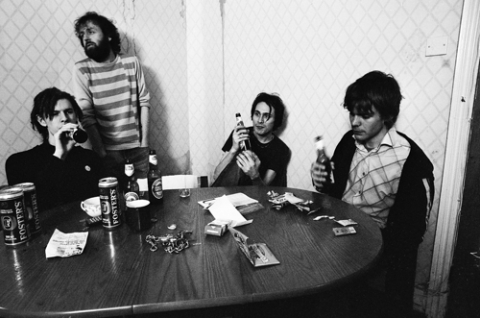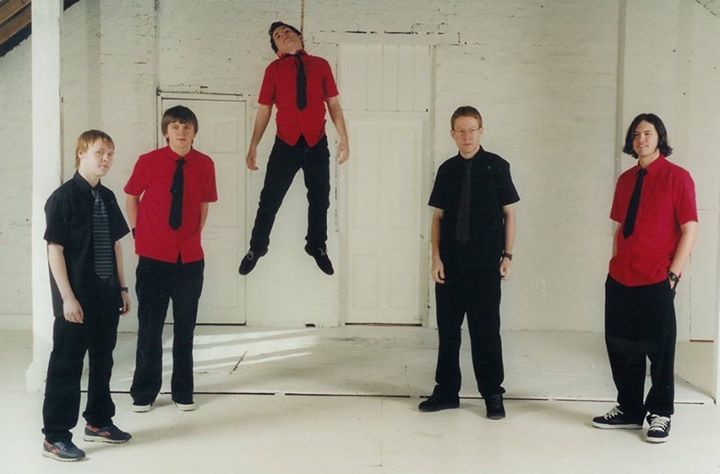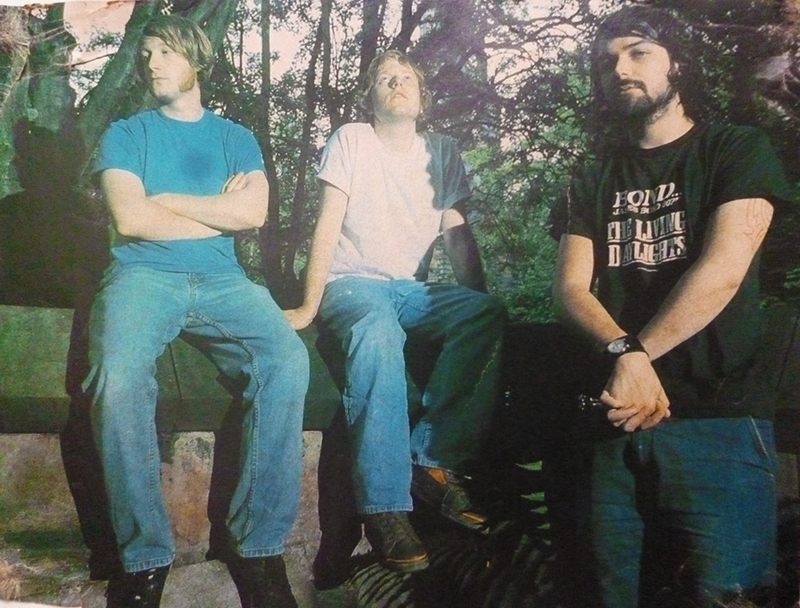Nostalgia | yourcodenameismilo
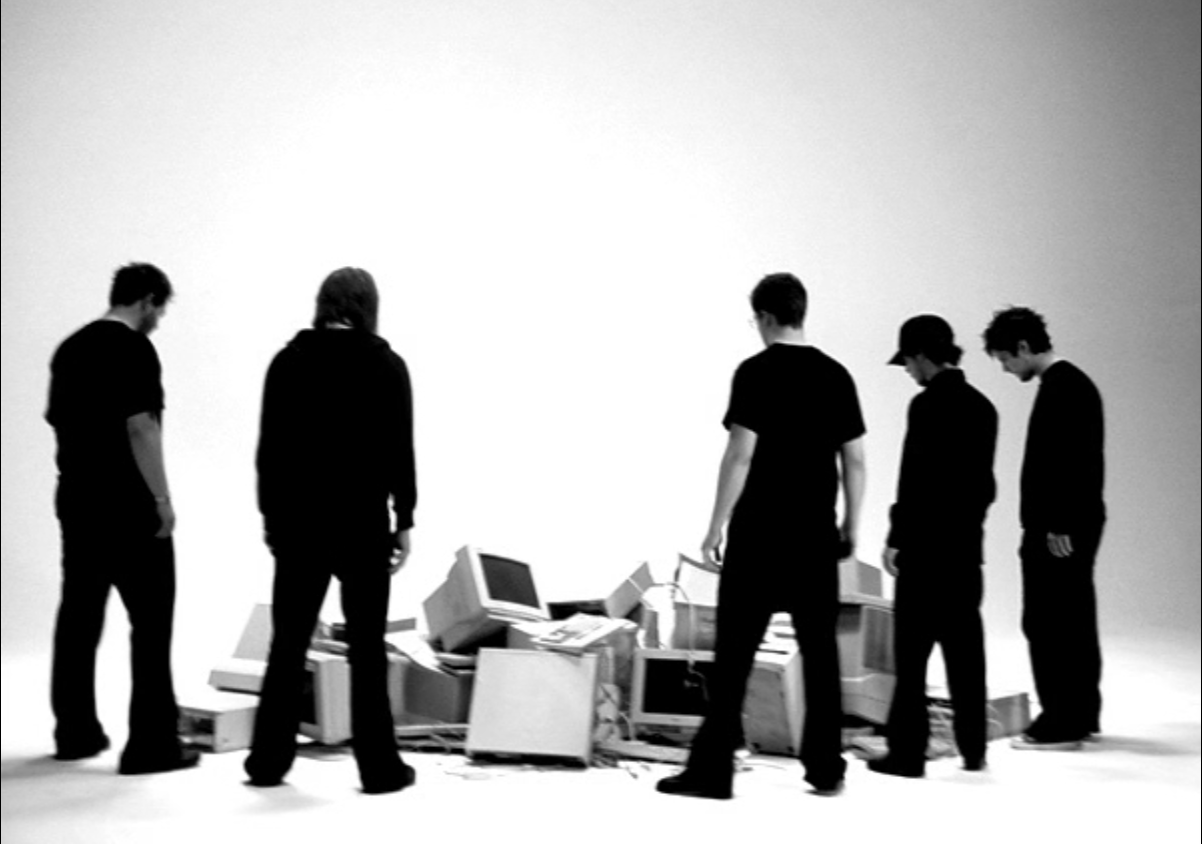
| yourcodenameis:milo (2000–2007) | ||
|---|---|---|
[Credits] |
[Subtitles] |
[AV] |
| Washington, Tyne and Wear | 2004 All Roads To Fault | |
| Gods Among Men | 2004 iShoes | |
| Peel | 2005 Ignoto | |
| Success! | 2005 Rapt. Dept. | |
| Pedals | 2005 Schteeve | |
| Washington Services, Brian Ferry, roundabouts | 2006 Print is Dead | |
| Past Reflections & Future Ventures | 2007 They Came From The Sun | |
Washington, Tyne and Wear
So musically you had a lot of places within easy distance and Washington had or has loads of odd little communities, supposedly villages, all with a slightly different configuration of roundabouts, a little ‘village centre’ with a chip shop, pub, news agent, drug problem. For a long time Washington was in numbered districts, that’s how functional it was supposed to be. This was going to be how we’d all live in the future.
I grew up amongst that, though by this point they’d given up on it being the future but no one said it out loud yet. It was like that Disney town, Celebration, but working class and in a lot of ways abandoned through under investment, like much of the North-East under a series of successive Conservative governments.
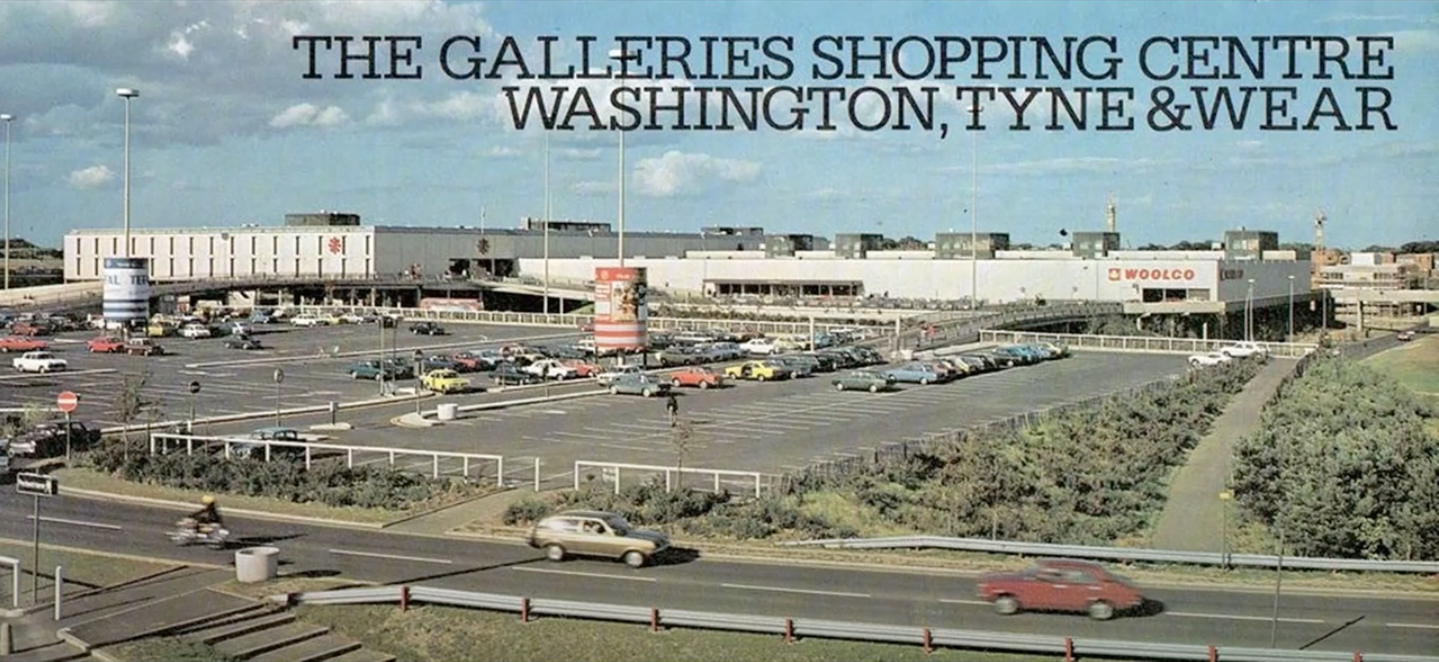
My dad plays the guitar so I guess it was always going to be a distinct possibility that I would too. I know people often talk of growing up in a house filled with music, that wasn’t really the case, the radio was never on anything other than Radio 4, there weren’t albums on with meals or singing around a piano as a family, my dad played the guitar on some evenings in the way other people’s parents watch sport. I’d hear my dad playing the guitar a lot and that was an inspiration purely in terms of work ethic, he’d spend ages working on voicing, positions, like Columbo trying to crack exactly what someone else had done, practising it until he got it right. That’s how I work now, learn a bit, move on, get the start sorted 100% before you hit the verse etc. etc.
“Whatever you’re into, listen to the opposite and hear the differences and similarities. Nothing was, or should be out of bounds… don’t write off a whole genre, that’s prejudice.”
There was a lot of private listening and I listened to a lot of music with my eldest brother; Aerosmith, Alice Cooper, Queensryche, Faith No More, Metallica etc. when I was like eight through to about 13/14. Then I started getting into a wider range of music; Red Hot Chili Peppers, Wu-Tang, DJ Shadow, DJ Krush, DJ Cam, U2, Talking Heads, Eno-related stuff, the Trainspotting soundtrack had a big influence on me, Iggy Pop, Underworld, Eno all in the same place.
I remember the first time I heard Born Slippy it really changed everything, the weird chords, the weird melody and delay, his accent not being American, the fact there’s like seven minutes of just brutal drums at the end and then you start to hear a melody within them. I’d never heard anything like it and such was the impact of Trainspotting it was in the charts for weeks, it was everywhere. It was chaos, a beautiful form of chaos, it showed me you could be that out there and that successful. Not successful by aiming for success but on your own terms, you could be successful by being good.
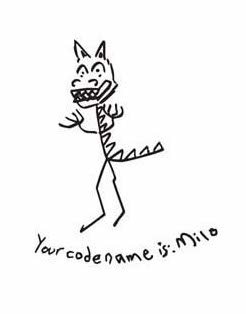
So I started playing around 12, around this time as a player you hit the stage where there’s what you want to do and what you can do, e.g. what is easy, you can learn Enter Sandman in first position but you’re not going to master the solo any time soon. This then hits again a few years after when you’re in a band proper and need to make enough noise to sound real, that makes you up your game really quickly.
So in between all of this you have ‘Britpop’ happening. That was a weird time. I was at secondary school. It was overnight, one day we were ‘sweaties’ and playing the guitar was dumb, then next thing you know the guys on the football team want to know if you can teach them how to play Live Forever. Of course we taught them. Of course we played Oasis songs and learned Ocean Colour Scene songs. Of course it got us nowhere when it came to girls which was the main reason we made the switch in our listening habits and haircuts. There was a real sense of, for better or for worse, ‘you can get away with this sort of thing? Wow’.
Gods Among Men
I went to college at 16 and met Ross and Bez in my A-Level English Literature class. For all our shared interest in music the thing that bonded us was humour, we were those slightly well read ones at the back of the class that made each other laugh and on occasion the teachers too. 16 year old Radio 4 panel show contestants; the worst kind of human. Bez played the guitar, Ross played bass (although I think he might’ve just had one of his dad’s in the house and had not started playing in anger as it were) and we somehow formed a band; Milo, named after Milo Minderbinder from Catch-22, and we did Free, Cream, Rage Against the Machine, Zeppelin, Radiohead, U2, Red Hot Chili Peppers covers and dipped our toes in writing and performing originals. This was a huge step up, all of a sudden you’ve nowhere to hide and need to up your game so I learned a lot in all of this and upped my game pretty quick.
I literally asked a mate of mine, Will, ‘have you got a good band name?’ and he’d read a Choose Your Own Adventure book called “Your Code Name is Jonah” about a whale shaped submarine. So as 3/5s of us had been in a band called Milo we pushed them together. Always have a friend you can call on who can immediately come up with usable band names.
In this I have a lot of sympathy for Bez; see Bez and Ross went to school together and played in the school orchestra (it was a comprehensive so a school orchestra seems incongruous) but Bez basically kept Ross right. Bez was better than me at the guitar, he’d learn Extreme songs for a laugh and totally nail Nuno licks just to make us laugh (he still does this). He was the only one with real, inherent musical talent so we made him play the drums, an instrument he’d never touched before because he was the only one who’d do it very well any time soon and no one else was giving up ‘their’ instrument. I think at the time I had my dad’s Gibson Les Paul but Bez had a Mexican Tele so he had to give up his guitar as mine cost more or at least that was my rationale.
So it would’ve been through the local (e.g. Washington level local) gigging scene where I’d first met Mullers. I remember the first time I met him he stopped me and this other guy who was in the other ‘good’ band at the time (both our bands covered Just by Radiohead and did the solo and everything, WE WERE GODS AMONG MEN), Mullers stopped the guy I was with as he knew him from school and said he’d started a band and wanted to support them and said, and I swear this is real “we’re called No Apparent Reason, ask me why?” “Why?” “For No Apparent Reason!”. Reader, there then followed an awkward silence.
Eventually through one thing and another I was in a band with Paul for a while doing covers and increasingly more originals. Even then Paul had a voice that was very different. Not quite American alternative, certainly no mid-Atlantic accent but not the laddish ‘Britpop’ yelp or the classic rock howl. Even when we did covers he never aped anyone else’s voice or changed his to give a close approximation to theirs. I left that band over creative differences with the bass player over his personality. The drummer in that band claimed he was a cousin of Ewan McGregor and once took potassium supplements to try and grow a full beard when he was like 17 and so ginger he made all the axolotls blush.
So Bez has come back from university for the summer or something and still played drums so we started jamming down at the Oxclose Music Project where Peter Brewis from Field Music worked with his big musical brain full of music and brains. Now that time was class. Peter and the other staff there knew we were more serious in approach amongst loads of other bands in there for the dating/drinking scene so we got away with some cheek but also keyed us up with some stuff at a time that was mind blowing.
Between us we’d have like one copy of Low by David Bowie and Peter would sing the praises of Let’s Dance, ‘don’t let the nerds put you off, listen to it now as it’s important,’ stuff like that, like the proper cool older brother from Stranger Things, but as I say, just with a head full of music. I remember him telling us about The Soft Bulletin when the Flaming Lips weren’t everywhere. That blew our head off. The drums but not in amongst ‘heavy music’… Whatever you’re into, listen to the opposite and hear the differences and similarities. Nothing was, or should be out of bounds, don’t write off a whole genre, that’s prejudice.
[Bez] was the only one with real, inherent musical talent so we made him play the drums, an instrument he’d never touched before because he was the only one who’d do it very well any time soon and no one else was giving up ‘their’ instrument.
Around the same time I was attending Northumbria University and wrote for the student magazine. Opposite their office was the Ents Office which booked the touring bands, Northumbria had two decent sized rooms at the time and was pretty regularly busy and in there was where Justin worked in lieu of study, I swear at his graduation ceremony he met some of his course mates for the first time. This was so long ago you could smoke indoors. Anyway, Justin used to nick all of my cigarettes but Justin was always the king of patter, like the way people talk about Clinton, made you feel special standing next to him, like you’re in on the joke then and everyone else isn’t, if you’re stood next to Jus you’re pissing out of the tent.
Now this isn’t something that I think Justin worked on in his personality or a sly hint at psychopathy, he just inherently has that kind of energy and sense to him, easy to get along with, easy to like and brings out that sense in you too. So Justin booked the bands and was always good for a tall tale of someone you’d heard of and also he played the guitar so I gave him a mini-disc of stuff I’d done with Ross and Bez and he’d burned me a CD of this trip hop remix of the Call of Duty theme he’d done. I don’t think he was expecting much and listened out of duty, everyone was in a band at this time, but then he listened and was like “I want in”.
I’d had to vouch for him to Ross and Bez as they’d never met him and there were a few arranged meetups where he was a no show and those two were all “Who is your imaginary cool friend Adam?” but once we met up it clicked and he pulled the old Clinton magic on them (“BALLOONS!”), sold them on his five year plans, industry connections (and reader, there were none) and then we were rehearsing.
Peel
I think we’d jammed a few times and knew we needed a singer. We’d invited two down to ‘audition’ with us but it was a Sunday morning so the other guy being a smooth talking rock player was too hungover and a no show. Paul showed up, we played loud for a bit, Paul was going to sing, we didn’t need another guitar player (again, I think my guitar was more expensive than his anyway), and then Justin put some tracks we’d already done on his mini-disc and told, I swear to god, just told Paul to sing over the top and then Justin cut the vocal takes together to make a ‘song’ or ‘songs’ and burned them to CD and sent them to Peel.
The CD didn’t work so Peel rang Justin (this is not verified) and said he wanted to hear it as he was intrigued by the band name as rather than a press release or anything Justin had just sent a burned CD with ‘yourcodenameis:milo’ scrawled on the top, and believe me, Justin scrawls. Somehow he or the producers heard it and we were invited to record a session. Paul wasn’t even in the band, it was a running joke he’d never actually joined, he was just on loan (like Chuck Mosely in Faith No More being on loan from Haircuts That Kill).
“We did a local gig, played London around the Peel session and pretty soon it was A&R guys coming to Newcastle and ‘you need to speak to this lawyer’ and us sending Justin in to tell Paul he wasn’t in his band anymore, he was in ours.”
I remember being in the studio and the engineers but you only have a day to get it all done. Obviously Peel himself isn’t there. There’s loading in, sitting, setting up, sitting, playing, sitting, vocals, sitting, mixing, sitting. A lot of touring and recording is like what you hear about crocodiles being able to slow their heartbeat so they can then use the stored energy to jump out of the water, you need to relax to store energy but you can’t relax fully, you need to be able to jump into action at the drop of a hat. I guess another analogy would be fielding in cricket, it goes on all day and you might not do anything for a long spell but if you aren’t ready when it’s your go to make a difference then that’s failure.
I do remember at one BBC session that I’d thought I’d broken my amp and had not plugged in a patch cable but spent like ten minutes trying everything thinking that it was all fucked and no idea how we’d record if I didn’t have a spare amp. It became a running gag later of “user interface error” especially if there was label or management about and we didn’t want look stupid in front of them, Justin didn’t press record “user interface error”, you’d not tuned up before starting “user interface error” etc.
We did a local gig, played London around the Peel session and pretty soon it was A&R guys coming to Newcastle and “you need to speak to this lawyer” and us sending Justin in to tell Paul he wasn’t in his band anymore, he was in ours. I can’t remember the first time he insisted on playing the guitar but I know I was hesitant as I’d just come out of being the only guitarist for so long I didn’t want to end up playing barre chords like Bonehead out of Oasis… but pretty quickly it was apparent that Paul brought as much guitar wise as he did vocally, just fucking things up enough, making it weird, have something steady underneath and someone go awry. If someone can always let you know where to nod your head or tap your foot then it frees up the space for more challenging parts to sneak in.
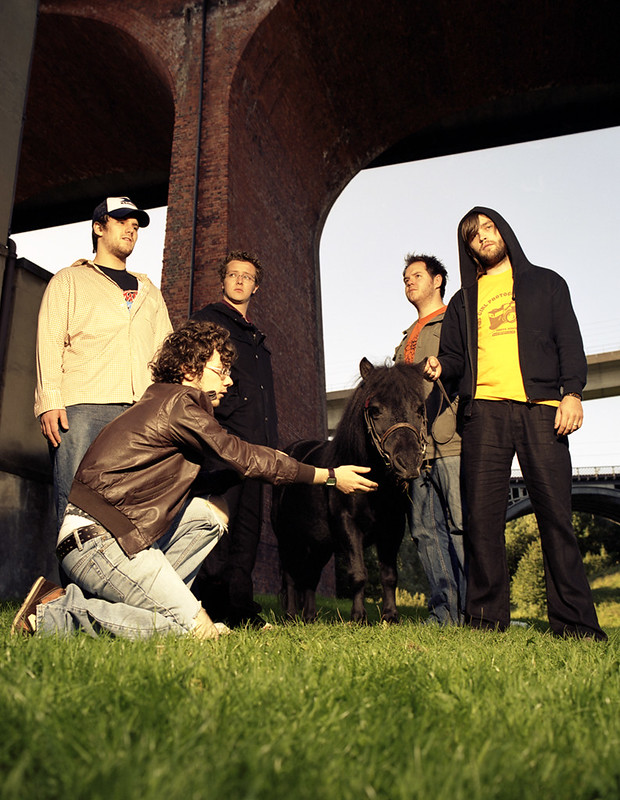
All Roads To Fault
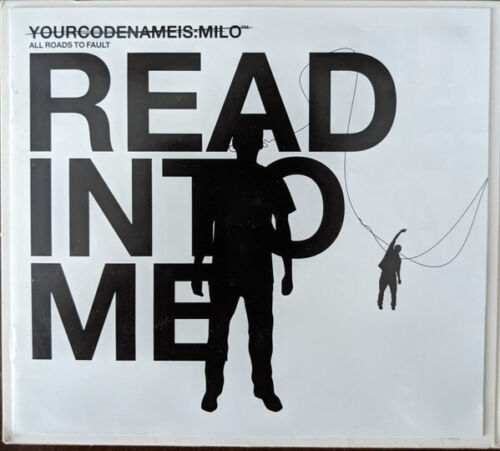
- All Roads To Fault All Roads To Fault [Fiction/Polydor 9886419] 2:39
- The Problem All Roads To Fault [Fiction/Polydor 9886419] 2:34
- Iron Chef All Roads To Fault [Fiction/Polydor 9886419] 5:07
- First Master Responds All Roads To Fault [Fiction/Polydor 9886419] 3:25
- Fourthree All Roads To Fault [Fiction/Polydor 9886419] 2:54
- Lions, Then Donkeys All Roads To Fault [Fiction/Polydor 9886419] 4:00
- Rob The Head All Roads To Fault [Fiction/Polydor 9886419] 4:14
“[The initial playback] didn’t sound great in my opinion, good but not great and it felt small and quiet… But maybe we were wrong, a few years back I finally had a decent turntable, listening to All Roads on vinyl on that set up and it was a totally different beast, it was all there, the separation, the bass, everything everyone else said they had liked about Albini and about All Roads.”
I’d not been to the US before, I think that was only the second time I’d left the UK. We were pretty cocky so when it was our publisher who said “have you thought about working with Steve Albini” of course we were like “yeah, of course we have” which we certainly had not. To be honest I knew very little about him then. I knew McLusky Do Dallas, Things We Lost in the Fire by Low and Seamonsters by The Wedding Present but it was long after recording, perhaps even towards the end of ycni:m before I first heard things like The Jesus Lizard and the things he’s more famously known for (Emma from Victorian English Gentlemen’s Club who is now in Islet thought I was doing a bit pretending not to know about them and burned me a copy of Goat afterwards).
Anyway, Hannah, our publisher, basically said you can just ring Albini and ask to work with him, she popped that bubble, he’s not some lofty mystic who descends from the mountain and says who he will record and then disappears, you send him a CD and if he’s into it and you can make diaries work then he’ll do it. He basically just works. This is what he wants to do and he does it. He was flat out, we were there from the end of Nov to early Dec ‘03, maybe four or five days and he’d not been outside since Autumn started. He was just working on bands. Local bands, teenage demos, big bands, no difference, you set up, you play he records it.
I don’t mean to imply that he is by any means absent minded or routine as a result of this work ethic. It’s one of those cliches about finding what you love and you never work a day again in your life, seemingly everyday Albini doesn’t go to work. Before we went everyone industry-wise was “don’t mention this”, “don’t say this about Universal, even by accident”, “don’t fucking mention Nirvana” as if he was firebrand that would explode and throw us out on the street if he knew we weren’t 100% punk rock DIY ethical at every turn.
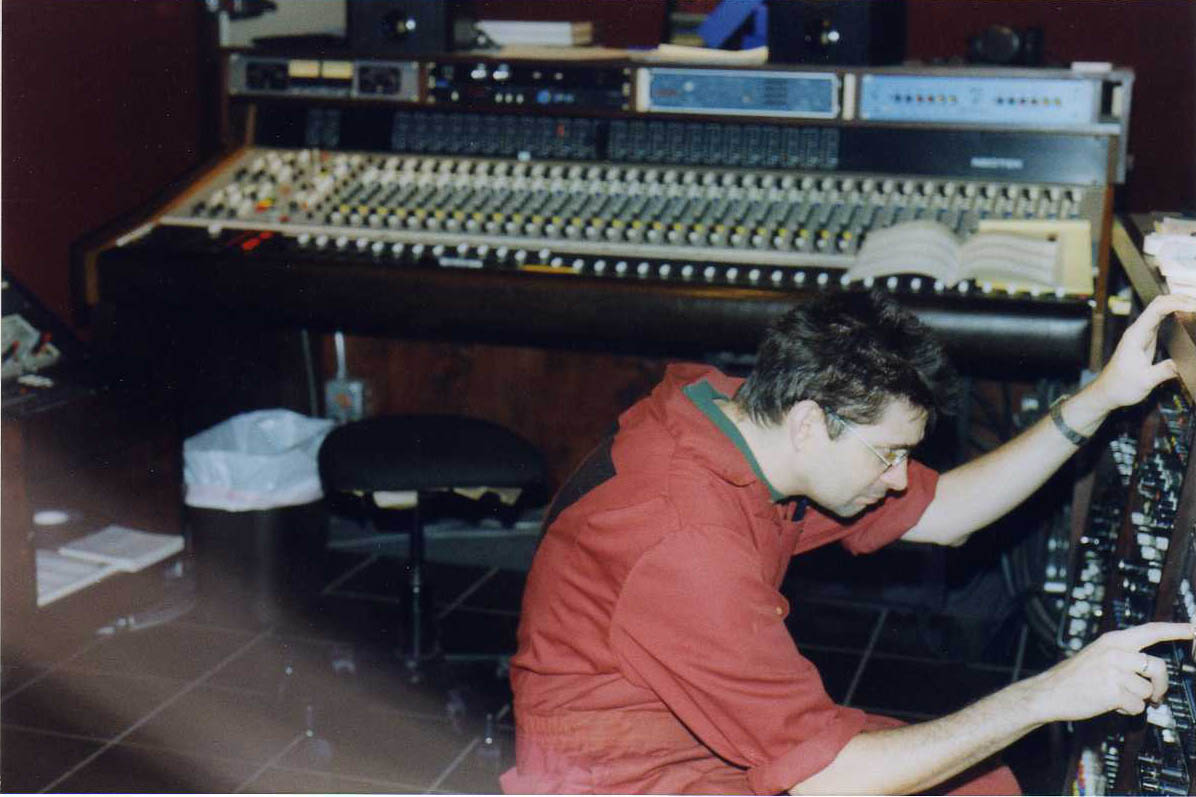
The great and inspiring thing, the thing I think most people miss about Albini is that he is entirely comfortable and confident in who he is. He’s got a robust belief system, he knows what he thinks is right but doesn’t care about you beyond being able to work with you or not. There were no tests to pass or anything like that it really was “I like this about the demo, I’m going to try and do this but bigger”. He was like a much older sibling who is cool enough to help you out but doesn’t try to make your friends his friends or have everyone think he’s cool, he just gets on with it, quietly and with authority. I don’t think he gets enough credit for being just a lovely guy who is thoughtful and considered but also comfortable enough in himself to say “I don’t know, maybe I’m wrong/I don’t know enough/that is only my experience”.
“I think I like All Roads more now than I have done at any point previously in my life and appreciate Albini’s approach, craft and technique more too.”
And in terms of the Nirvana thing, he had some college work experience kid there who just loved Nirvana, literally walked about with a printed sheet of which concert bootlegs he had and which he needed so clearly Albini wasn’t that arsed. Although this guy was seemingly never allowed in the studio so maybe he was… Which was fair enough. I got trapped once in a 30 minute conversation with the intern where he listed all the different types of cola the US has and after each one “Do you have that in the UK?”. Like Christopher Guest listing nuts in Best in Show.
So working with him was incredibly easy and easy going. It was our first time in a studio so we were giddy anyway but you also did all the tracking in one take live so you don’t have all the waiting around you might experience otherwise (e.g. on Ignoto or TCFS there were periods where I’d not play the guitar for days at a time). We just left it up to him and didn’t say anything. In retrospect that was a mistake.
We were all bunched in on the window sill to listen back so we could hear the bass, it didn’t sound good when we sat on the sofa he’d put there for bands to sit on and specifically listen. We should’ve probably have something but we didn’t have a clue and he’s Steve Albini, I mean clearly we’re wrong right? It didn’t sound great in my opinion, good but not great and it felt small and quiet. We abandoned a version of First Mater as it just sounded weird and re-recorded 4/3 back in the UK.
But maybe we were wrong, a few years back I finally had a decent turntable, listening to All Roads on vinyl on that set up and it was a totally different beast, it was all there, the separation, the bass, everything everyone else said they had liked about Albini and about All Roads. I’ve since gone back and listened to the Albini version of 4/3 and it smokes the one we put out, it’s baffling we didn’t put it out to be honest, like not a regret as such just plain foolishness.
Whether that’s time and distance or experience or a mixture of all three I don’t know but I certainly appreciate it and what he did for us and has done on other records much more than I did at the time. I’d love to work with him again knowing what I know now, he records well, very, very well, but if it’s not there to be recorded, not being created by you to start with, it’s not going to appear. I think when I went I expected a drastic change, a magical sheen, it would sound ‘pro’, mistakes would disappear by virtue of Albini recording it but that wasn’t in us and that’s not what we went there for. I think I like All Roads more now than I have done at any point previously in my life and appreciate Albini’s approach, craft and technique more too.
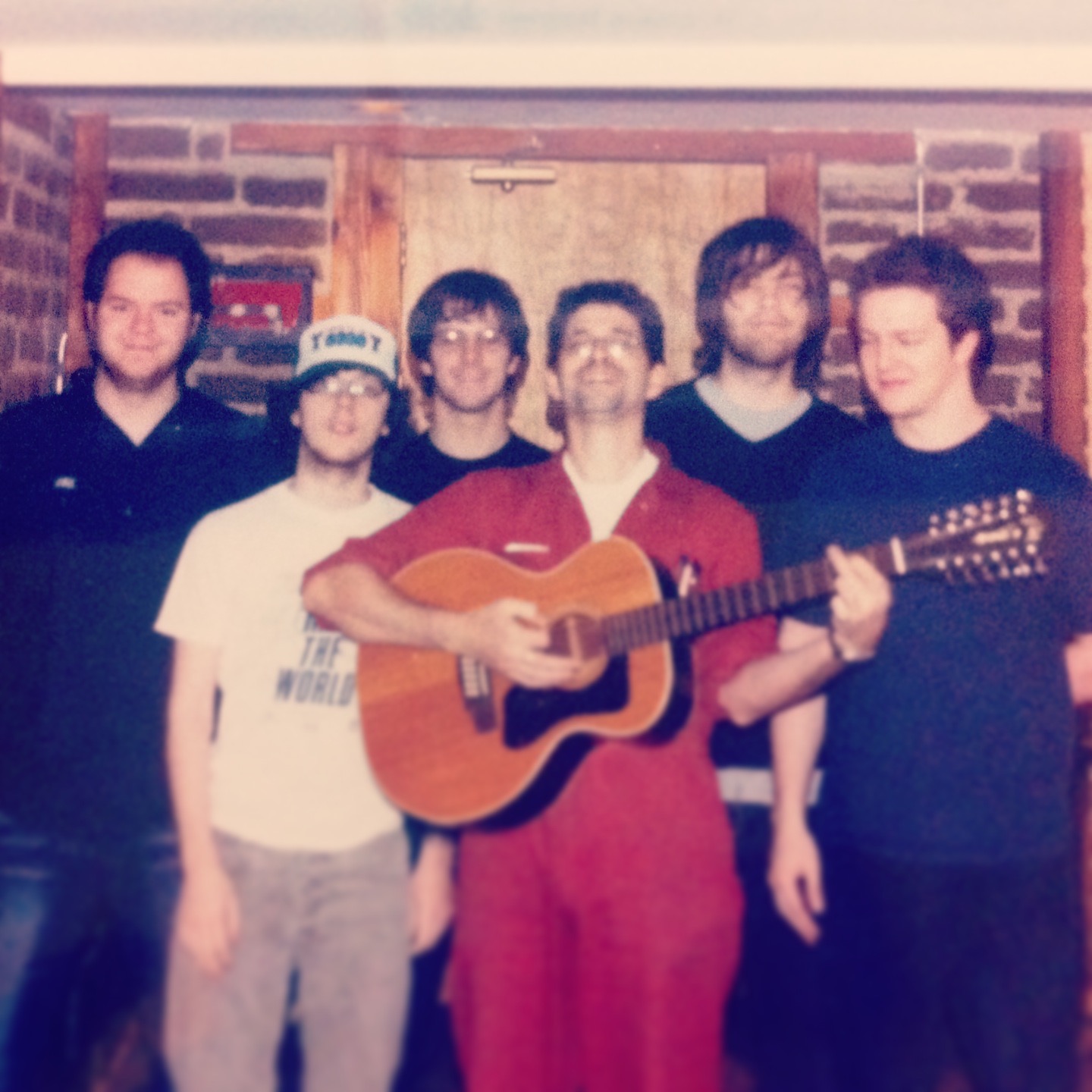
The artwork was all down to David Bailey who was at The Designers Republic at the time. That was put together by our manager Craig Jennings. He used to manage Pop Will Eat Itself who’d worked with them a lot and then The Designers Republic were basically the artwork gurus for all Warp releases for a spell, certainly Autechre.
“All Roads had a working title of ‘1 minute 56.’ We shot The Problem video on the same day as All Roads; when Paul was doing close ups for All Roads I did my parts for The Problem.”
So anyway Craig hooked us up and on a day off or between a gig in Leeds and Sheffield or something when we had a bit more time we went to their offices in Sheffield. Someone basically sat with us and a load of design ideas they had in the middle of a room while all these super cool dudes with big fuck off headphones, unbelievable jeans and trainers and proper rare as fuck dance or skate t shirts on worked around us, literally around us with their backs to us. So we knew that what we were looking at was clearly their work.
So we’re trying to be diplomatic about it all and then there’s this one with loads of scribbles on that jumped out, I’m pretty sure one of the pictures on the back of the album/in the sleeve was pretty much this picture, maybe the one of the pregnant women marching with AKs, so we all loved it and started talking and David takes off his headphones and turns his chair around and is suddenly like “if you like that then you’re gonna LOVE this” and starts firing off pretty much the logo and the full idea of the designs and how he’d reacted to the music.
Now David clearly knows his stuff but again he was suddenly like your cool mate, “have you heard of this band? What about these”. The Designers Republic also let us raid their promo CD box they were about to get rid of and I remember getting THRAK by King Crimson out of there and being all “you’re just going to… not listen to this again? Giving this away? You fools!”.
All Roads had a working title of 1 minute 56. I don’t think at that time there was a plan for David to direct the video but I think all the treatments we had were pretty shit and generic, clearly some people had a video idea then changed the name at the top of the submissions, nothing wrong with that, plenty of people have great videos based on that approach. But as David had really clicked and to keep the progression he got offered it and we went from there. This would be our first video so having him around really helped relax us too. We shot The Problem video on the same day, when Paul was doing close ups for All Roads I did my parts for The Problem.
I think we had some say in the direction but I don’t remember getting too involved. The thing was we were five people with quite different interests and backgrounds and skills in the band, much like IMF from the popular Mission: Impossible series of films and TV shows. Justin could talk to the industry sorts and then decipher for us afterwards what they’d meant, he knew the politicking and was willing when the rest of us weren’t or didn’t even know it was an option to say “No, we as a band are not going to do that” or as I mentioned earlier, just send John Peel a CD, I mean who does that? Anyway, Muller’s is an art school dropout which means he knows as much, if not more than an art school graduate so he was in his element there. I think there was some hard ‘no’ or ‘reign that in eh?’ but the details were Dave and him.
Success!
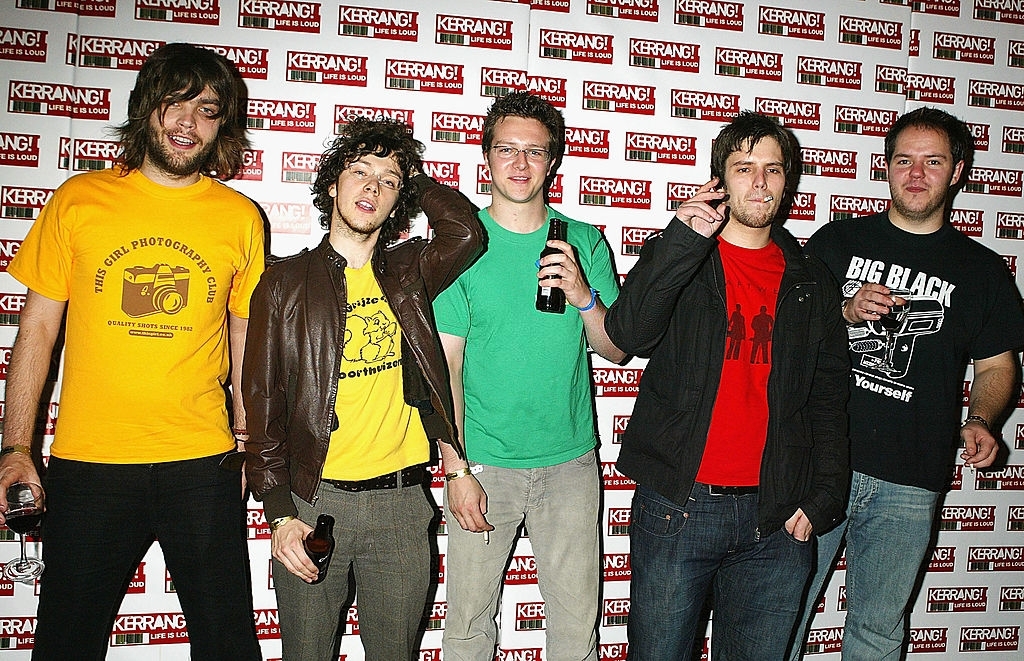
Well this really depends on how far you can stretch the meaning of success before it snaps. I’m fairly certain we were in the studio recording what would become Ignoto when All Roads came out. It didn’t do great numbers sales wise by any means and I do wonder if we’d have been allowed to record in a big studio with Flood had the sales report come in before we started recording in anger. We did a lot of gigging around this time in the UK, various support tours and were playing Leeds what felt like every fortnight, a lot of big and small festivals.
“You need to remember the internet came through and devastated the industry almost overnight… In the time milo were active it went from pirating music as being something one guy with a NASA type computer could do to order to something anyone could do at any time in about an hour.”
I think this is where we come to the crux of what was either the problem with milo or the root of what makes it special for certain people, perhaps or probably both. At the time there were a lot of second or third generation UK emo bands going on with shiney guitar sounds and hair straighteners and we played with them, sounded nothing like them, their fans didn’t really like us. We’d then open for a more traditional jangly indie or post-punk skinny jeans crowd band and again their fans didn’t like us. We were too scuzzy, too noisy, a bit of a challenge, people either loved us or were indifferent. There were more people who were indifferent. We would pick up a couple of fans each gig. This sounds fine but that means if playing a whole 20 date tour gets you 60 new fans, the amount you’d expect to pick up each night if you were more easily palatable, then this will cause issues.
Certain sections of the press got behind us in a big way and conversely this didn’t help, this just made people who were previously indifferent pretty angry as this band they kept getting told were the future of intelligent guitar music meant nothing to them. I mean there was a spell where we’d put on MTV2 and watch the Zane Lowe show and you’d see either us with All Roads, The Futureheads with First Day or Kaiser Chiefs with one of their songs that had a bit that went ‘woo’. Fair to say we stuck out. I remember my eldest brother who I got a lot of my early music from told me it had finally clicked for him after repeated listens out of duty. He didn’t used to like it but on the umpteenth listen it clicked. Unfortunately repeated listens out of duty isn’t a business model. Also I remember him telling me “hey, you’re number one on Limewire” and I don’t imagine if you’d downloaded something for free you feel the need to invest time in repeated listening.
The thing with the industry, and something I certainly felt acutely aware of, is you have to be moving forwards and growing or you’re at risk. You’re playing a small venue, you need to sell it out and next time you’re in town playing the bigger one and selling that out on the back of your next single or album which has to be more successful. So in terms of enjoying success I honestly don’t think I did, it was like “we’re on Zane Lowe’s MTV, we need to be getting on rotation proper”, “that sold X number of copies, we need to sell XX copies”.
I remember even getting quite cynical around this time and it got worse as it went on, people would say something complimentary about the band and I’d either discount it or just panic. This was like one person and the four or five people they came with didn’t think the same, no sir. It’s not uncommon for artists of all types, from what I gather, the whole thing of five good reviews and one stinker and the stinker is the one that you think is right or has the most worth.
There was a lot of talk even then about being a long game and that’s what I believed, we believed it and it was well intentioned but this was the start of alarm bells. You need to remember the internet came through and devastated the industry almost overnight and we existed at the stage where it seemed it was going to be like taping, a little fad then things will settle back to normal. In the time milo were active it went from pirating music as being something one guy with a NASA type computer could do to order to something anyone could do at any time and might take about an hour on a desktop.
“Certain sections of the press got behind us in a big way and conversely this didn’t help, it just made people who were previously indifferent pretty angry as this band they kept getting told were the future of intelligent guitar music meant nothing to them. “
There was a palpable sense of panic in the industry and we were planning on being around and making a living for a while, to do that we needed to be selling a shit ton of records and All Roads was suddenly being talked about as a ‘statement of intent’, ‘mini albums never really sell, it’ll pick up after the album proper”, things like that which you wanted to believe but… little voices in the middle of the night and all that.
So yeah, ‘success’, looking back I should’ve been more alert, aware and mindful to enjoy it for what it was, live in the moment not the expected future, but it was all supposed to be the beginning, this was the time for hard work, I’d seen plenty of bands with less of a chance than we have suddenly get arrogant and cocky, piss it all away so I’d wanted to keep my head down, I didn’t really get that I could work hard, enjoy the benefits and ego boost and not endanger future ‘success’.
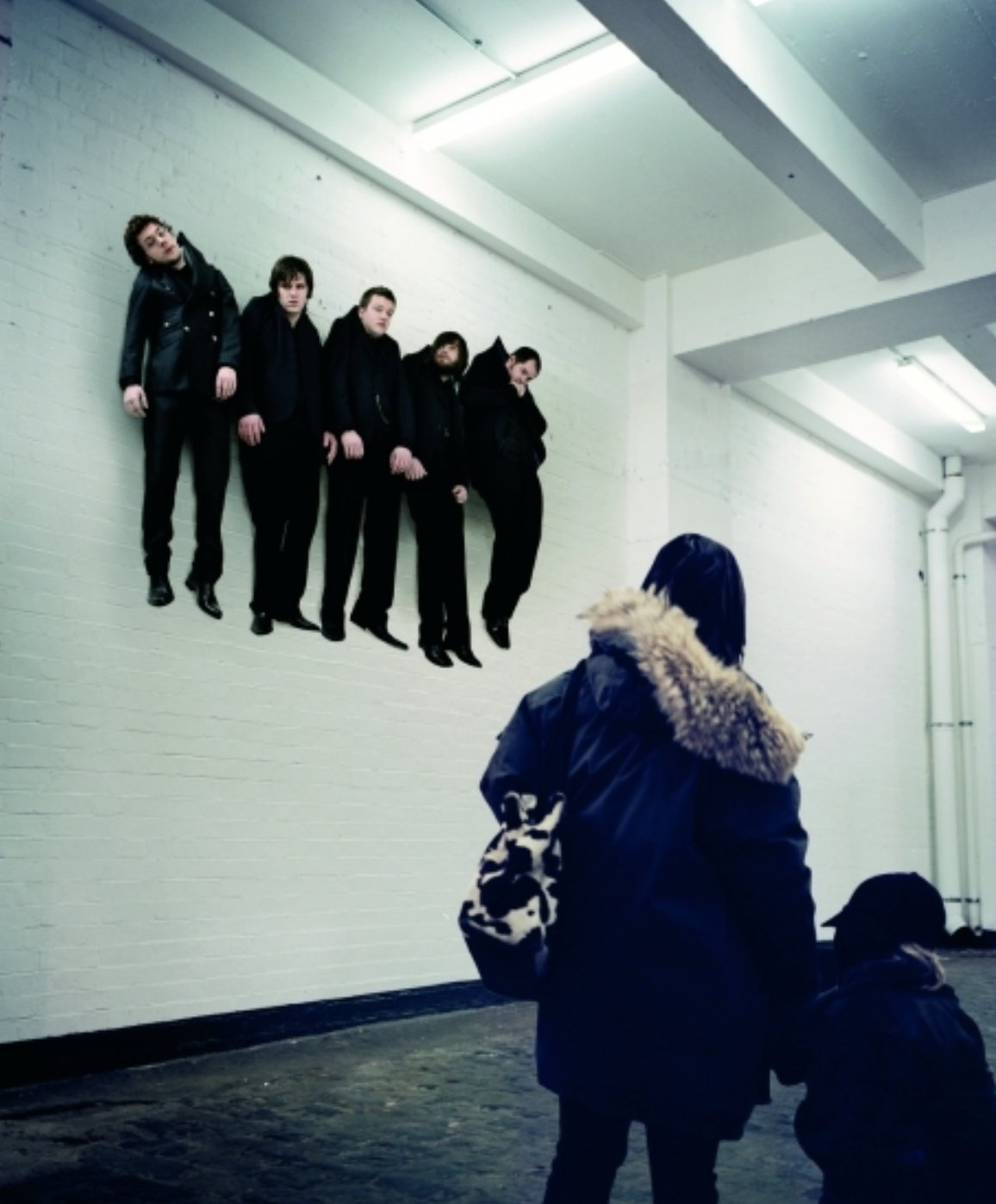
iShoes

- iShoes iShoes [FICTION003] 2:38
At the time I was really cocky about iShoes coming out on vinyl, didn’t care, CDs are where it’s at, dead technology is vinyl, just you wait. I’d love to hear everything else on vinyl, that said I don’t dislike CDs, I’ve still got all of mine and still buy them regularly. They are still technically better quality and more durable than vinyl but there’s a warmth in the bass on vinyl that you just can’t get on CD. Maybe that’s just me persuading myself that I need version number two or three of the same album, this time on vinyl though (having previously bought the CD album, then the CD remaster).
I think originally iShoes was an exclusive for one gig. That might’ve been the gig where Paul got the shoes. I remember it happening. He had this pair of Dunlop Greenflash or maybe just the white plimsolls you used to get in the Army and Navy Surplus shop and they were held together with gaffa tape, increasingly more gaffa tape than show. For a spell, prior to white glasses, that was his ‘thing’, I remember him getting given the shoes because it wasn’t clear if it was a nice thing someone had done or like a low key diss, like “the joke is over now”.
Ignoto
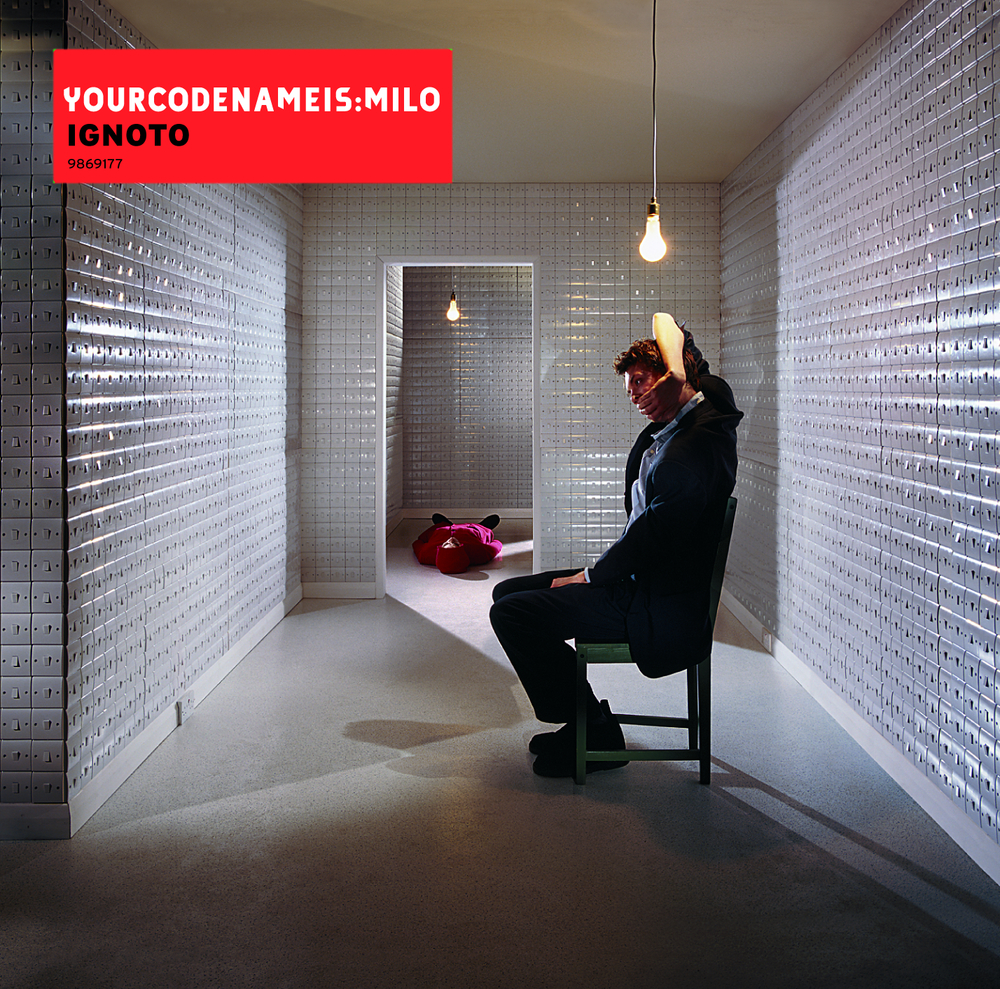
- I Am Connecting Flight Ignoto [Fiction 9869177] 2:58
- 17 Ignoto [Fiction 9869177] 3:16
- Titan Grip Ignoto [Fiction 9869177] 3:07
- Rapt. Dept. Ignoto [Fiction 9869177] 4:12
- Schteeve Ignoto [Fiction 9869177] 4:14
- Team Radar Ignoto [Fiction 9869177] 5:07
- Fivefour Ignoto [Fiction 9869177] 4:43
- Yesterday's Head Ignoto [Fiction 9869177] 4:08
- Empty Feat Ignoto [Fiction 9869177] 3:40
- 2-Stone yourcodenameis:milo 3:02
- The General Ignoto [Fiction 9869177] 3:20
- Audition / Unfinished Drawings of Cats Ignoto [Fiction 9869177] 11:22
So I’d say 70% at least of what would turn into Ignoto was already written before we went into the studio. We were either already recording or about to start with Flood in London when All Roads came out. We were touring pretty steady around the time but think we just blitzed it. I think certain songs might’ve even existed prior to recording All Roads. We were all confident in writing and there was a lot of bouncing stuff around. For instance 17 was written right at the very beginning, it was on the first Peel session we did in a very proto-QOTSA rip off kind of way, I remember me and Bez writing the guitar parts pretty quickly once and not even in a ‘let’s write some music’ sense – it just happened. Then prior to Ignoto it just got worked over.
“There were two important things in the process and they relate to ego: there was genuinely very little of it about there was no competitive element. Writing was genuinely easy and very democratic. I used to just fill notebooks with lyric ideas and give them to Mullers and he’d filter them out.”
I think it’s fair to say, broadly, that a lot of the rhythmic weirdness came from Bez and Mullers, I tried to do something sonically to make it sound less like a standard via use of effects or not playing what other bands would, Justin gave it a hook, something you could hold onto to root this thing to the outsider (King Crimson have a quip about being able to ‘make you tap your foot in 21’, that’s what Justin brought, it was usually him or me that would get sick of counting and point out that the part might be clever, but it was shit), Ross had a real battle to find a space for the low end in amongst three guitars, often I think he and I would work in unison, like on the chorus of Connecting Flight.
Ross and myself had a bit more of a childish sense to it, we were always the ones who were “you know what would be cool? Play the riff twice as much/half time/an octave lower”, “that’s cool, why don’t we do it again”. In terms of arrangements we were all in on those, we were all confident and it was so easy to be “Right instead of parts ABC we’ll try part B then C then B but lower then A for two”. Whichever version sounded the best won. It was very rare, if ever, that someone came with a song that was finished, had lyrics and melody and parts were taught.
Writing was genuinely easy and very democratic. I used to just fill notebooks with lyric ideas and give them to Mullers and he’d filter them out. For instance I know I’d basically ripped off the idea of The Passenger by Iggy Pop for I Am Connecting Flight and it was all about how once you pass through security at an airport you cease to exist as an individual, you’re manifest, stock, all “I am this, I am that, I am the other” and that was stuck in amongst loads of other lyrics. Paul would work through, see what stood out and jump off from there so the finished song was very much the product of a collective process.
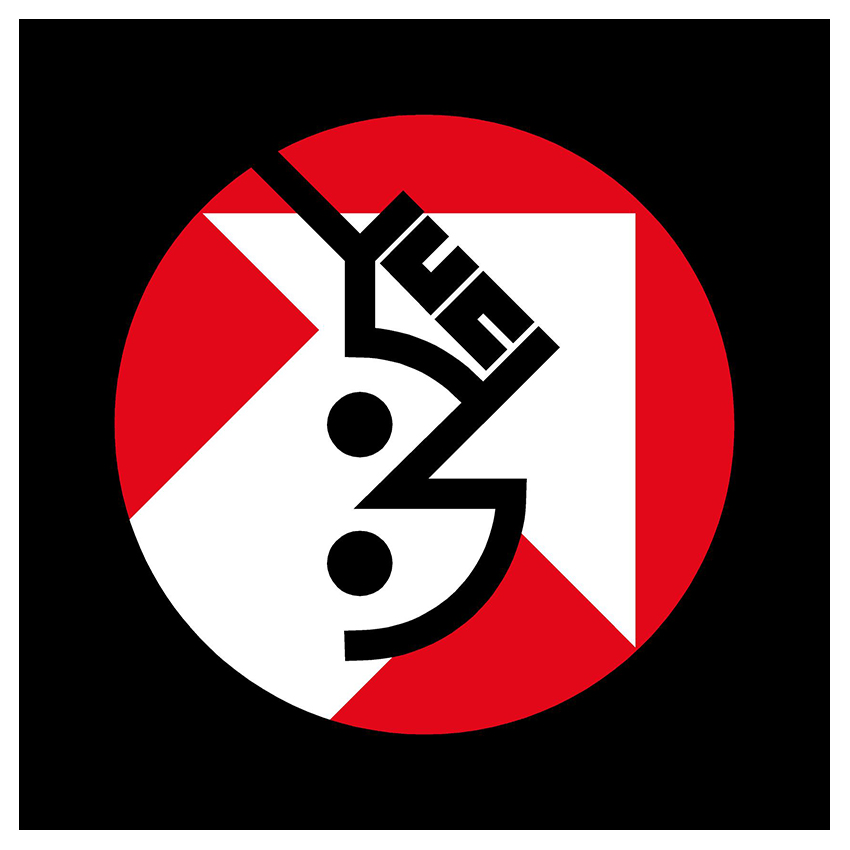
There were two important things in the process too and this relates to ego. There was genuinely very little of it about. In the three guitarists there was no competition to be ‘lead’ (plenty of jokes/jibes about it though), there was sometimes competition on stage to be ‘loud’ but that’s different… Also in terms of ego when writing there was no competitive element in terms of ‘this song is finished but I have not had any creative input therefore I must insist something is changed’, which is very important and I’ve heard horror stories of other bands where this can really hold things up or create tension, or worse albums when you can hear that someone has gone full diva and wanted ‘their’ song on there, or even worse, sung it. This is not to say that there were never creative disagreements that went on for days or everyone got their way.
In terms of writing being easy that was due to us all having ideas. There was never writer’s block or prolonged periods of tension, we were really good at leaving the tension at the door or it dissipating overnight if things got especially fraught but again there was always so much humour. With having five sharp minds in there we were wise enough to have two people scrap it out and then someone else pop the whole thing with a well placed joke.
“This was the best time for me, sat in that studio for like a month was just great making music, everything felt possible and when we heard what we were doing back it just kept getting better, everyone we played it to was blown away. Looking back it was like the six weeks holidays when you were a kid.”
We used to either rehearse songs or just work on parts then turn them into songs. Everyone always had something we could draw on and build on. If there was ever a time it just wasn’t working we’d just call it and come back the next day, we never had any stressed all nighters working on one thing to no avail.
So when it got to recording we worked with Flood who I’d been a huge fan of for years via nine inch nails’ The Downward Spiral and his work with U2 on Achtung Baby, Zooropa and Pop (people like to have a go at U2 but they had a stretch of like 6 or 7 records that are fairly peerless and incredibly weird for what would become stadium pop). Flood is much more of a producer than Albini (this is deliberate on the part of Albini and he consciously takes the credit ‘recorded by’ to reflect this) and he was much more hands on and instructive around re-ordering parts, layering the sounds, arrangements, finding a place for everyone, basically refining the songs as well as the recording of them. There was a lot of creative play in the recording process, much like how we worked there was just a lot of “try this?” and if it didn’t work there was no harm, if it did, that was the song now.
To be honest this was the best time for me, sat in that studio for like a month was just great making music, everything felt possible and when we heard what we were doing back it just kept getting better, everyone we played it to was blown away. Looking back it was like the six weeks holidays when you were a kid, every day was sunny from 6am to 10pm, no one got a hangover, ate like a king, we were in London but didn’t feel like we were, we were working tourists. The other thing was we always felt like outsiders, as such hearing stories about or seeing famous people was always an absolute treat for us.
Rak itself has three working studios so there were always other bands and people floating about, Feeder and Gil Norton talking to us as they were celebrating the bass player’s birthday and they were hammered and Gil Norton explaining I had failed by not owning a Gibson Flying V, Brett Anderson watching Family Guy over our shoulder in the common room, the drummer from Travis wanting to make cups of tea for anyone as they were recording with Brian Eno and the drums were clearly now done and it was the rest of the band who wanted to work with Eno not him, walking down the corridor and nearly knocking over Sporty Spice.
So that was just idyllic. Raj the in house engineer telling us ghost stories and then using shortcuts in the building to freak us out by banging on walls etc., Mark Williams the assistant we’d brought with us playing table tennis and doing things that really shouldn’t be possible in terms of the laws of physics. This is to all say that it was a completely pressure free environment whether by accident or by a design unknown to us. We were convinced we had created a license to print money, but reader, we had not.
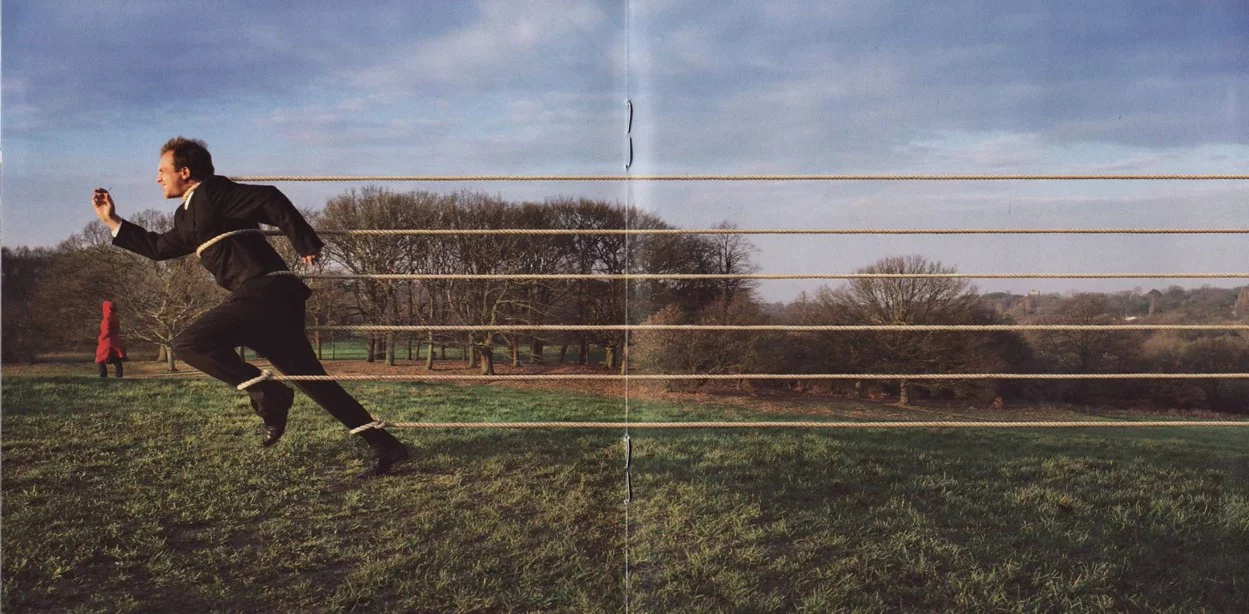
Flood was working as the producer and Mark Williams who’d recorded First Mater for All Roads and done some mixing tweaks on some of the other tracks as assistant. We’d done demos with him in the past at his studio and we initially started recording the album in the studio he worked from but it just wasn’t quite there so Flood suggested we de-camp to Rak. In terms of funding for it, I’m not sure of the number but it was not a cheap record to make. I think Flood took a small fee and percentage points offset against future earnings as he wanted to work with us.
Rak is a huge, prestigious, central London residential studio so that was not cheap by any means and we were in there for a couple of significant stretches of time. I don’t think anyone was really worried about the costs in the beginning but as it neared completion I think there was a sense of ‘hold on, this is fairly abrasive and non-commercial’ which started to creep in amongst some of the industry team. As if some people thought we’d gotten the scrappy stuff out of our system with Albini and then being in with Flood that would be chipped away at and come out refined and more commercial.
For some people it wasn’t a problem, I mean a British band that seemingly sat halfway between Smashing Pumpkins and nine inch nails (both produced by Flood as well) and neither of those were struggling to sell records. I remember our manager started worrying away that he didn’t want this to be a ‘lost classic’ but everyone just seemed confident it would be fine, the next album we’d be back doing the same thing, in the same seats having had a successful first album cycle.
“I think if we’d recorded Ignoto with anyone else [than Flood] they’d be b-sides and we’d have been sent back to make songs with choruses crowds can sing.”
Flood was great to work with, very zen in terms of having you naturally arrive at an idea he’d suggested, again this isn’t a slight, he pushed you in a direction and let you feel your way through it, if he’d simply said “do it this way” then we’d have been passengers in our own process. He possesses a very calm coaching attitude and a good mental health approach like he was able to read the band and tell if that was it or if pushing for a better take would yield results. Proper man management stuff, very intuitive and very calm, with us as a young band he took the brunt of the worry and responsibility for us and gave us a lot of advice musically, career wise and personally.
I think if we’d recorded Ignoto with anyone else they’d be b-sides and we’d have been sent back to make songs with choruses crowds can sing, any industry suggestion of changes was met with a very calm “we thought about that but instead…” from Flood and that satisfied them. I think that if anyone has had a difficult experience recording with Flood, then like Albini, perhaps that speaks more to them.
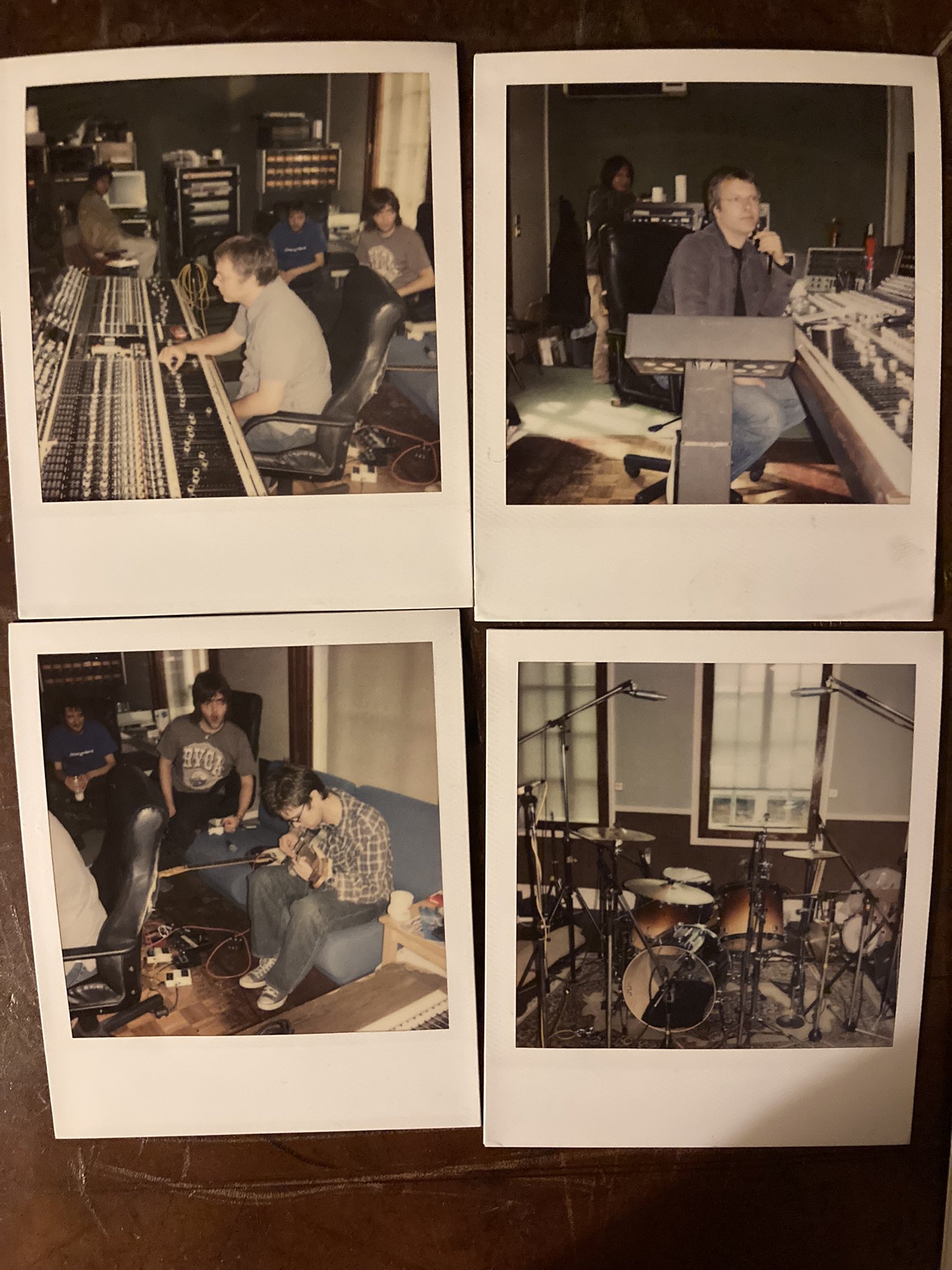
Listening back to Ignoto there aren’t any lows as such, I’d always had a problem with how Yesterday’s Head came out in the first 2/3rds of the song, we’d slowed it down by ½ step after it had been recorded and I thought we shouldn’t have but that’s about it, everyone else loved it, democracy means I have to take it. Otherwise it’s surprising how full on and exciting it is. And how many hooks. It comes out of the gates quick and takes a series of corners too fast. But there’s not just riffs flung together, there’s also a lot of textual stuff like Audition, Team Radar and 5/4 which I don’t think any of us saw coming.
4/3, 5/4, 6/5 were originally supposed to be about time signatures but 5/4 is the only one of them that is musically correct/possible and even then I’m not sure it is in that time signature. We had a feel for the weird but not the musical knowledge to decide it or do it deliberately. I think Audition was the only song written entirely in the studio, that was a lot of fun, a lot of “fuck everything, I’m writing a piano part!”.
“Working with Storm Thorgeson was pretty unreal. He was quite frail at that stage but was still quick and sharp, like Radio 4 clever, that kind of scampish humour but with a deep understanding and vision.”
Unfinished Drawings and Awake/Sleep are from around the same time too, I think Jus finished Unfinished on a laptop on an aeroplane. That harmonic sound is something Justin used a lot for atmosphere, if you rub a drumstick like a bow against the fret on a guitar you get a really nice drone sound that can be pleasant or abrasive as you need it to be. We also used the Sigur Ros bow thing a few times, it sounds amazing but it is so unmistakably their sound you can’t use it in good conscience. Listen carefully and I reckon that sound is on about 100% of the songs on Ignoto somewhere.
Working with Storm Thorgeson was pretty unreal. I mean he’s Storm Thorgeson. Like Flood has worked with a lot of people and a lot of really cool celebrity stories that unfortunately are not my place to tell but he’d hung out with literal megastars and even he was like “you guys going to meet Storm Thorgeson in the pub? Really? That’s odd, I was going to go to the exact same pub at that time, might as well come with you”. So Storm was there, he was quite frail at that stage and came with Peter Curzon who we worked with more regularly but Storm was still just quick and sharp, like Radio 4 clever, that kind of scampish humour but with a deep understanding and vision.
He had a few ideas, we chose some and he then fleshed them out. Again I think it’s fair to say that he and Mullen had more of an affinity and we stayed out of the way of that relationship, too many cooks and all that. So we met him maybe three or four times, and each stage it was at a different stage of completion but I don’t recall any major back and forth, it was Storm Thorgeson, he knew what he was doing, if you’re going to suggest he do something else maybe we shouldn’t have hired Storm Thorgeson.
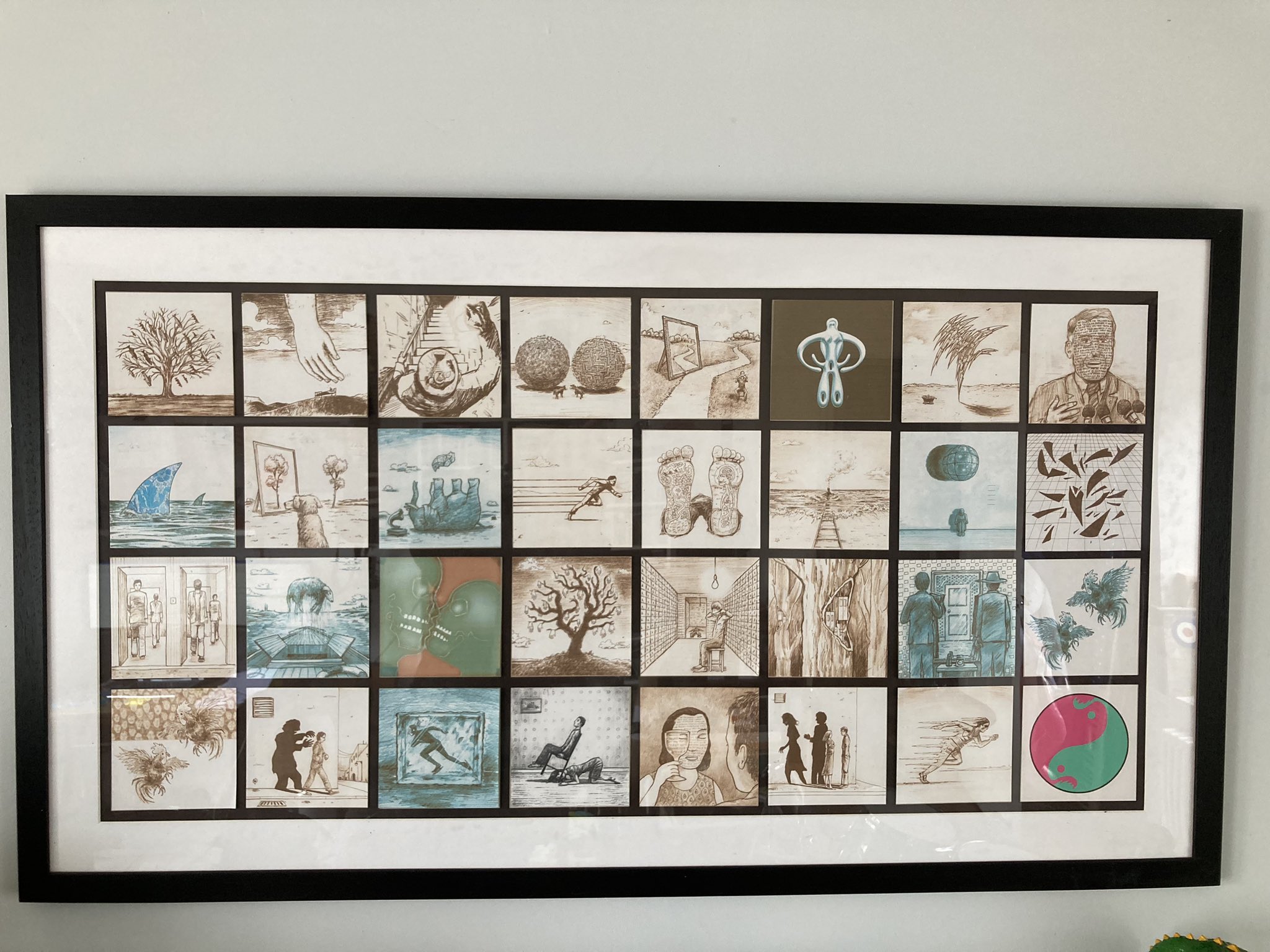
Rapt. Dept.
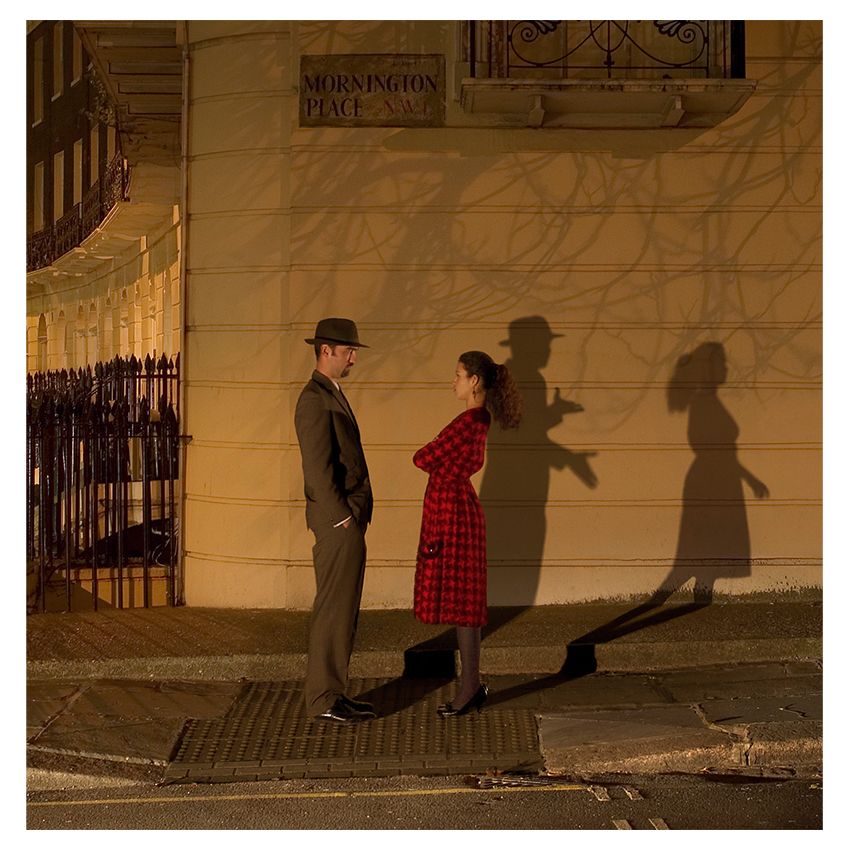
- Rapt. Dept. Rapt. Dept. [Polydor/Fiction 9870231] 4:06
- Awake/Asleep Rapt. Dept. [Polydor/Fiction 9870231] 2:56
- Athletes And Tourists Rapt. Dept. [Polydor/Fiction 9870231] 3:28
- One Ninja Rapt. Dept. [Polydor/Fiction 9870231] 4:20
Pedals
“I was setting up ready to go on so the crowd was quiet and this one guy turned to his friend and in a very matter of fact voice, not shouted but I heard, said “His guitar sounds awful”. I was nearly knocked off my feet, it really stung.”
So pedals then – I think out of all the guitar playing wings of milo I was the least fixed on pedals and was chopping and changing all the time. Muller’s always had a great tone, really clear but weighty, he’s always got that breaking up amp rather than driven. He used a Mesa Boogie V-Twin pre amp through an Orange head a lot with a Marshall cab and his Tele, not sure if it was a custom, it had binding on the body and certainly wasn’t a standard. He also had and likely still has and uses (he did for Young Legionnaire certainly) a Rat that has something wrong with it but sounds like nothing else as a result. It kind of makes the signal really small then boosts it. As an aside on that, I’d bought a Smokey Amp in the US, a little battery powered amp in a cigarette packet, it had an external out so we ran a lot of guitars through that into a 4×12 on Ignoto, again pushing that small made big, broken sound.
Justin had Fender combos then a Fender Bassman head and usually had whichever pedal one of us wasn’t using. If I had a Rat he used a Big Muff and vice versa. His pedal board was minimal, tuner and drive. He used to turn his amp up all the time, it was a real problem for the band and our soundman when we played live. So I’d have to try and fit in between them flitting between loads of drive, little drive, really bass heavy, mid heavy etc. I went through various Big Muffs, Metal Muffs, Hot Tubes, Graphic Fuzz, Rat, Fuzz Factory, Prunes and Custard, boutique fuzzes, cheap fuzzes, I don’t think I started a tour and ended with the same drive pedal, I was never really happy with my sound but I never really knew what I wanted, I just wanted something more, something landmark.
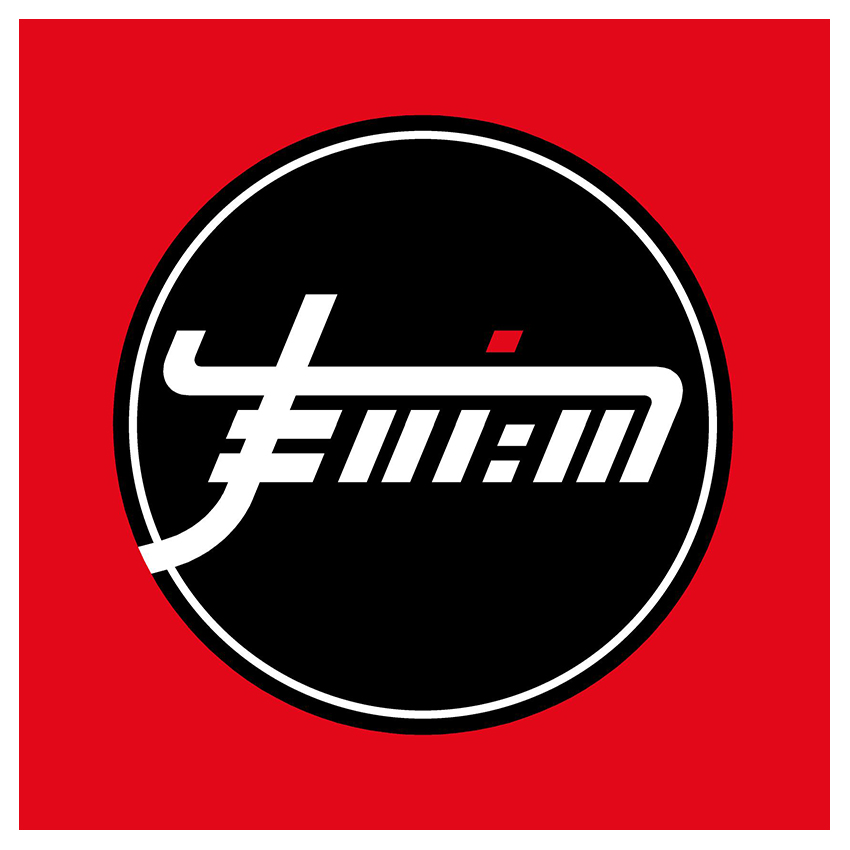
I honestly love the guitar sound on St Anger, so brittle and breaking up but not really thick slabby distortion in the sense of say Pantera. Billy Gibbons from ZZ Top has some unreal tones too, but I was more concerned with the drive side than that tone being good and then putting the gain in. I remember early on Flood trying what now was a pretty zen approach to having me realise I wanted drive not distortion, gain and clip etc., he brought in a bunch of his pedals, some he’d used with The Edge. I still rate The Edge, I’ve not listened to recent stuff but from like ‘84 to ‘98 his guitar was pretty peerless and singular. Anyway, the fuzz on the midsection of Discotheque is unreal so I wanted that level of saturation and he had brought in all of these boutique drives but I didn’t take the hint. Now I still use Boogies and pretty much just knock off clones of really expensive pedals, still fuzzes but the gain is rarely past 12 o’clock. I really like a posh tone that sounds like it’s been kicked about and pushed a bit.
“We had this sense of being on the edge of chaos, these vast loud sections, everyone playing something different then sucks into everyone playing one riff half time, there was a lot of making sure songs and the set list were even, that there was enough darkness and light, enough chaos and order.”
Now I know it starts in tone and tone really starts in the playing, I used to ‘hit’ my guitar rather than play it so the tone, definition and sustain was lost in aggression that was just trying to produce volume. I’d gone through a Fender Bassman Combo (tubes kept exploding), Fender Twin (tubes kept exploding) and finally settled on a Mesa Boogie Mark IV and started using the on board drive on that in conjunction with a fuzz pedal for options. Just as we stopped I think I was getting better and getting nearer but it’s like practice, you’ll never be done. I do remember one the gigs at Truck Fest in Oxford near the end where I was setting up ready to go on so the crowd was quiet and this one guy turned to his friend and in a very matter of fact voice, not shouted but I heard, I certainly don’t think he intended me to hear it, and said “His guitar sounds awful”. I was nearly knocked off my feet, it really stung.
I wish I’d kept a diary to note performances, what we played and how it went. I remember little of the music, just the events around them. As I said about the session recording being long periods of inactivity followed by intense flourishes of activity, touring is much the same. I can remember dressing rooms, hotel lobbies, load ins that were up stairs, record shopping in different cities, traffic jams, pub lunches, jokes, days off etc. but not gigs where everything clicked or a particular song soared in a way it never had before. Again this was in part because I’d assumed it was going to go on and on, no point in remembering this, there’s going to be years of this stuff to remember.
I do however remember feeling that we were tight. We were always proud of our playing and performance. It feels like something of a cop out, you could not like us but you couldn’t be indifferent, you could not like what we were doing but you couldn’t say we were bad at doing it. We had this sense of being on the edge of chaos, these vast loud sections, everyone playing something different then sucks into everyone playing one riff half time, there was a lot of making sure songs and the set list were even, that there was enough darkness and light, enough chaos and order. Take a song like To The Cars, if it wasn’t so quiet for so long it wouldn’t work. We’d all seen (and played with) heavy bands who gave you 60-70 minutes of just heavy, 20 minutes in and I would be bored, I’d be immune to the trick that was breathtaking 10 minutes ago.
17

- 17 17 [Polydor/Fiction 9871094] 3:11
- Undone 17 [Polydor/Fiction 9871094] 3:54
- Capitol King 17 [Polydor/Fiction 9871094] 2:39
- pottercommajoseph 17 [Polydor/Fiction 9871094] 3:28
Pottercommajoseph is a Dawson’s Creek reference. In the one where they go to college – Joey gets put in a dorm with a boy and when she asks they say there’s been no mistake “the form says right here, ‘Potter comma Joseph’”. Ross and myself lived together for a long while and we watched a lot of Dawson’s Creek. It was our on tour watching too. For clarity the rest of the band weren’t into it the same way and could never tell if it was irony or not and probably still can’t. I remember someone who worked at Kerrang telling us the then editor hearing it and asking what it was and when someone said the artist and name he shot up and went “That’s from Dawson’s Creek!” and the office went deadly silent and stared at him.
Death of A Disco Dancer
- Death of a Disco Dancer How Soon Is Now? [SORE008CD] 3:34
So we’d been offered a chance to appear on a The Smiths tribute album alongside Million Dead, Hundred Reasons etc. We chose Death of Disco Dancer without much thought to be honest. We didn’t want to do it per se, we were offered cash. It just seemed pretty simple and we could mess with it, the only drive was how do you put a riff into this totally anti-riff jangle pop band, we’d been sent a list of what other people were doing so it was really a case of what’s left.
I think it’s fair to say none of us where Smiths fans as such, didn’t mind them but not fanatical certainly. We had to write something for the sleeve notes and Ross and myself drafted this thing about how Morrissey had once told Peel his favourite services in the UK was what we’d assumed was Washington Services so we just talked about that, Bryan Ferry and roundabouts, pretty sarcastic. We honestly felt kind of awful when the album finally came out and there were all of these genuine, heartfelt essays by other artists about how The Smiths had changed their lives and we just took the piss out of the whole thing.
I don’t feel bad now, obviously Morrissey’s behaviour and comments are abhorrent, we’d not do it now if the situation was the same, knowing what we know now, there’s a lot of difficult discussions about separating the art from the artist going on and to be had but I’ve got nowhere near enough time or respect for The Smiths, and Morrissey in particular, for that to be a hill I’m going to stub my toe on, let alone die.
Schteeve
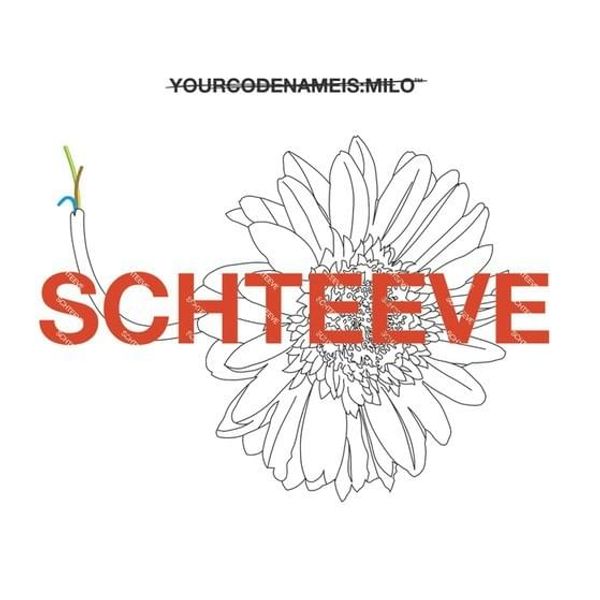
- Schteeve Schteeve [Fiction/Polydor 9868525] 4:07
- TV is Better Than Real Life Schteeve [Fiction/Polydor 9868525] 1:57
- The Dead French Schteeve [Fiction/Polydor 9868525] 3:43
Ross had a flatmate called Steve and the joke in the flat was to pronounce his name in ever more ridiculous ways, we’d need a name to differentiate one song from the other, it got called Schteeve once and it never changed.
The delay on that track… I honestly can’t remember what was used. Live and when it was written it was a Boss DD5, setting 6 I think is the reverse one, but in the studio it may have been one of Flood’s delays instead or as well, I seem to remember a Watkins Copycat or similar floating about for a bit, an old reel to reel tape one. The idea behind that was to build a peak like effect, I’d stop the part and by the time the reverse had played I’d start again so it was peaks and troughs, ebbing and flowing. Then there was the ebow part, which I think I also played, that’s my superstart moment on the record. That and the really, really nasty F octave towards the end of The General (you know which one).
TV is Better Than Real Life is based on something our guitar tech, Little Adam, said on the How to Spend £15k in One Day making of Schteeve, he pointed to the monitor as a gag that we looked better on the screen. Thanks Little Adam.
I think that track’s probably us doing a Part Chimp impression, their first album had us all obsessed with them to various degrees. So you’ve got that huge lumbering guitar and bass line, I had a Fender Musicmaster II which is a shorter scale guitar, as such there was a harmonic that was easier to sound around the 3rd fret than you can on full scale guitars, I wanted something to stick out amongst the lumbering riff. The drums sound massive. I think it was a deliberate exercise in clever and stupid, for all the riff of it, it’s very short and only really has three parts and two of those are the same, and the chorus is one chord. I think this would have been the first recordings we made entirely ourselves that got publicly released, there were no B sides recorded with Flood.
Print is Dead
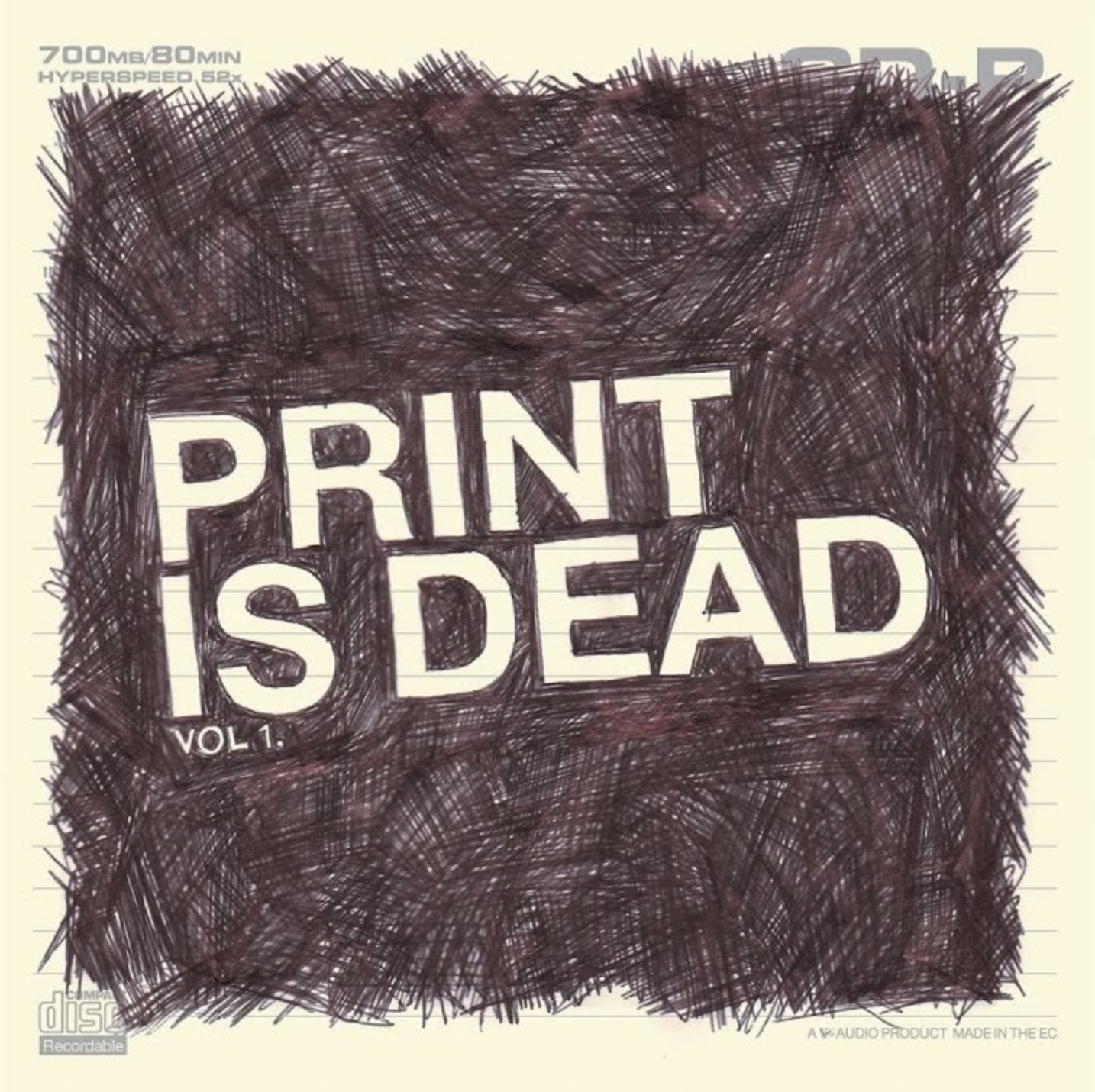
- Greetings (w/Hot Club De Paris) Print is Dead vol.1 [VVR1041922] 3:21
- Wait A Minute (w/Gordon Moaks - Bloc Party) Print is Dead vol.1 [VVR1041922] 3:47
- The Trapeze Artist (w/The Automatic) Print is Dead vol.1 [VVR1041922] 3:29
- I Remember The Summer Isles (w/Ross Millard - The Futureheads) Print is Dead vol.1 [VVR1041922] 6:18
- Roots/Branches (w/Tom Vek) Print is Dead vol.1 [VVR1041922] 3:14
- We Hope You Are Who You Think You Are (w/Martin Grech) Print is Dead vol.1 [VVR1041922] 5:10
- Deborah Bow (w/Peter Brewis - Field Music & Deborah Bow) Print is Dead vol.1 [VVR1041922] 1:46
- Captain of Lies (w/Jamie Lenman & Guy Davis - Reuben) Print is Dead vol.1 [VVR1041922] 2:44
- Ordinary Day (w/Lethal Bizzle) Print is Dead vol.1 [VVR1041922] 3:38
- Tiny Vessels (w/Get Cape. Wear Cape. Fly) Print is Dead vol.1 [VVR1041922] 4:31
- Noah (w/Lucas Wooller - Maximo Park) Print is Dead vol.1 [VVR1041922] 7:47
- Plans For Everything (w/Ultra Brain) Print is Dead vol.1 [VVR1041922] 2:51
So Print Is Dead started with me as an idea. The idea was born out of a few things, possibly not all artistic or altruistic. We knew by the time we’d finished the Ignoto tour that it hadn’t crossed over in the way we and others had hoped or planned. I and certainly other members of the band (I say that as I don’t want to assume the thoughts of others) weren’t comfortable with how we were being presented in the press, with all of these invented scenes that ended in ‘emo’. We didn’t feel any particular kinship or imperative to align ourselves with most of these bands. I felt us being pigeonholed into a subcategory of heavy music that seemed to require you’d done the reading ahead of time was helpful to us at all. I’d envisaged Print Is Dead (as it would become known) as a way to contextualise us as being more normal, palatable and musical. I’d suggested it quite nervously to Justin to float it to test the water, I was surprised when he was so enthusiastic and this carried on through the rest of the band. The plan was to make a mixtape, various genres but we were the common theme.
“Most musicians get their music for free and don’t have any money. Critical acclaim doesn’t pay rent.”
We’d always been a ‘band’s band’. Musicians seemed to love what we were doing, passive listeners (and there’s nothing wrong with listening to music and enjoying it in a less involved way) less so. Now most musicians get their music for free and don’t have any money. Critical acclaim doesn’t pay rent. I thought we could cash in on that and show our breadth and depth in collaboration and reach out to a variety of other band’s fans in doing so. We’d known Peter Brewis from Field Music for years, knew Ross from the Futureheads through him, and I think we met Lucas from Maximo Park the same way. We’d met Rueben through gigs or festivals. Pretty sure Mullen met Martin Grech on a night out in London, we were all big fans already. Lethal Bizzle and Hot Club Du Paris were hooked up through the industry.
So there were a variety of ways we got in touch. The rules were we had a day to do it, nothing could be written ahead of time (though this slipped with people bringing things in various stages of completion). We’d then be there on the day and see what happened. We worked hard from our end to not force ourselves on something if it wasn’t working, for instance I didn’t play on the Hot Club Du Paris track, I was jamming along with the idea and nothing worked, every time I stopped and tried something else the song got better for my not playing, eventually I just stopped, went to sit at the desk and looked at things from that side. We were keen to make sure the songs worked, not that each one had recorded input from each of us. It’s a mixed bag to be honest, some of it I’m more proud of than others but it was worthwhile and I’d love to do it again.
The whole project was only possible as we had our room and we had time. As I’ve said earlier writing was never difficult so we could rehearse four days, have someone in for Print Is Dead on the fifth and then pick up the next week on our own stuff. It was as much to blow off steam and not get bored or stuck in our own process as it was about trying to reposition ourselves.
One of the first things we did as a band was get a rehearsal room in Byker in Newcastle, we were upstairs from a back alley garage, after a few years, I can’t remember exactly what stage we moved next door where we could have the upstairs and the downstairs. We halved the downstairs into storage at the front, rehearsal room at the back and upstairs there was a sofa, a little room we’d turned into a booth and a desk with the computer and interfaces to record etc.
It was all done by us and Paul’s dad with his carpentry skills (the creation of the live room was all him) but it was still pretty basic, rough and ready. The mic leads literally went down the back of the floor upstairs to the live room so we could demo live just by pressing a button and eventually it became clear that if we weren’t going to be swimming with cash then paying a producer to make us sound like what we already were was pretty stupid.
“I think practically, it’s harder than ever to make music together given how busy everyone is and where people are physically located across the world…. which, given our approach and past history, means it’s more likely now than it’s ever been before! If it doesn’t make sense then we do it; it’s the milo way.”
Justin had been non-stop on recording and working with other bands and building on what he’d learned from Flood so it would’ve been a huge waste of money to not do it ourselves. What we lost in the sense of a professional, comfortable environment with cutting edge tech we made up for in having essentially unlimited time for recording and experimenting. This could lead to frustration, as you’d think a song was finished then suddenly you’d be starting it again for the ground up. It was definitely worthwhile but at the time it could feel like a step back.
The setting up of the room was a major strength for us that allowed us to go on for longer than otherwise might have been possible and certainly maintain quality. Bands exist on record and live, we created a space where we were nearly self sufficient, we didn’t cost us to rehearse as such, didn’t pay for separate storage and didn’t need to pay to record. Moving to London was never really something we thought of a possibility, going up the A1 was easy enough and the money we saved by living outside of that bubble allowed us to continue, there was no way we could’ve kept going as long as we did outside of Newcastle.
It is a shame that as the room was rented and not owned when we left a lot of the stuff just got ripped out. It’s now a used furniture shop where they sell deliberately unfashionable lamps to hipsters for much more money than it’s worth.
THROWBACK to @alex_zane filling us in on #PrintIsDead for DMA’s. with @paulmullen @justin_lockey @rgtmillard @blaineharrison @KAAPSLOCK #YCNIM pic.twitter.com/bL3jNP8M1q
— YOURCODENAMEIS:MILO (@YCNIMblog) August 11, 2020
They Came From The Sun
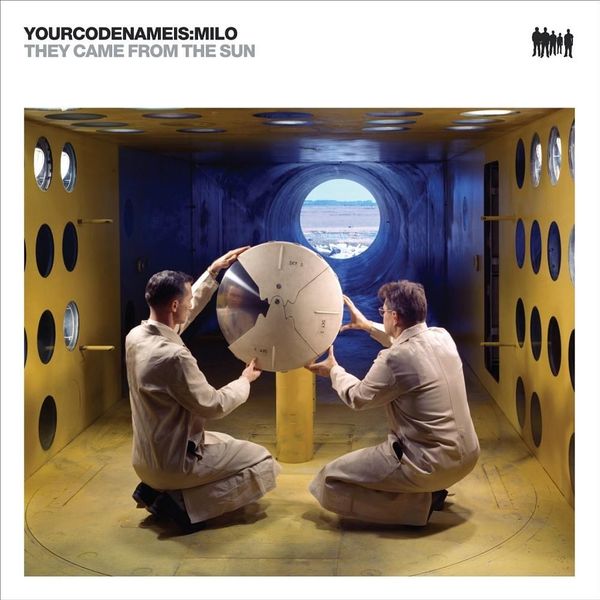
- Pacific Theatre They Came From the Sun [VVR1042802] 3:46
- All That Was Missing They Came From the Sun [VVR1042802] 4:49
- Understand They Came From the Sun [VVR1042802] 3:48
- I'm Impressed They Came From the Sun [VVR1042802] 4:40
- About Leaving They Came From the Sun [VVR1042802] 3:17
- Sixfive They Came From the Sun [VVR1042802] 4:31
- Translate They Came From the Sun [VVR1042802] 4:03
- Evening They Came From the Sun [VVR1042802] 5:19
- Take to the Floor They Came From the Sun [VVR1042802] 4:54
- To the Cars They Came From the Sun [VVR1042802] 4:39
- Screaming Ground They Came From the Sun [VVR1042802] 4:20
- Dicta Boelcke They Came From the Sun [VVR1042802] 1:30
The sales of Ignoto being such there was no way that Fiction were in a position to go ahead with the advance to fund the next album, and I think that in hearing the demos there was no reason for them to believe that if they had pushed to get a higher advance that the results would be any different. It was in the contract, it wasn’t a shock. There was an option there for us to take a significantly smaller advance and stay with them or just leave the label entirely. The advance offered wouldn’t have supported us long enough to do anything useful.
“Within three weeks of leaving Fiction we’d signed with V2, our lawyer said that was unheard of. We had to keep going, had to keep moving forward, had to keep moving.”
I felt awful as Fiction was home and I felt we’d put our contacts there in a really bad position, we’d not repaid their investment in a financial sense and not repaid their faith in the sense of delivering. If they didn’t present us with those two options after the amount of money spent on Ignoto I’d guess they’d have been reprimanded and then a stranger would’ve told us the same thing.
They were really good about it but it was a real shame that these people you’d speak to all the time and you genuinely liked and got on with just suddenly weren’t around. Not ill will but it would just feel weird talking to them, like you’ve split up with a girlfriend but agree to stay friends, you don’t just carry on immediately as you were, and I certainly, just never started again which I do regret. We’d built rapport and trust with them but we just had to push on.
Our manager Craig, obviously being able to tell the way the wind was blowing knew V2 and approached them. Within three weeks of leaving Fiction we’d signed with V2, our lawyer said that was unheard of. We had to keep going, had to keep moving forward, had to keep moving.
Just prior to all of this Bez had left the band too. I think it’s fair to say the uncertainty around everything and external pressures put him in a difficult position and he left the band. This was very difficult for all of us but again, you feel you have to just plough forward, don’t think about it, thinking is a luxury for later, so as a result I didn’t process it and just bottled it, didn’t know what I thought; was I angry at him? Was I angry at me? Was he right to do what he did? Should I have done the same thing? All I’d do was shake my head to stop thinking about it and move forward.
Between the departure of Bez and TCFTS coming out we’d basically scrapped a full album’s worth of stuff, some for the best, others less so. There’s some stuff that got repurposed for parts, others scrapped entirely, some re-recorded, there’s a guitar heavy version of About Leaving that exists for example. So TCFTS was better for what it became but I remember feeling frustrated at a lot of great material being written off as we’d moved on; I agreed we had but it still seems a shame this stuff would just get filed away like at the end of Raiders of the Lost Ark.

Bez left the band in the morning and we’d approached Shaun that afternoon about joining. Shaun was an astonishing drummer, where Bez has a deep feel for music and due to his lack of ‘proper’ training an odd approach that resulted in drum parts that drummers wouldn’t play, Shaun was all technique and power. The new stuff we wrote with him was great and playing with him was a pleasure but he was the new kid, it wasn’t like being in a band with someone you’d known for years and years. The dynamic changed.
“They Came From The Sun sounds halfway between the textural space rock of Ignoto and scrappiness of All Roads. I think it sounds like Bruce Lee, it’s lithe, still muscular, still powerful.”
So in the announcement we put out of Bez leaving we’d announced that Shaun had joined. While again this was intended to put a message out of “business as usual, we’re fine”, perhaps talking to ourselves more than any audience, looking back it was pretty classless of us and didn’t give Bez the space to be appreciated and acknowledged that he deserved at that time.
Another regret from the same time is I don’t think we made Shaun fully aware of what he was joining. Aside from the dynamics of the relationships involved and slotting in (which he did easily, he’s a very good musician and very easy to get along with on protracted journeys) I don’t think we’d prepared him for the stress and uncertainty he was entering. I think we’d sold him on a being a professional musician, steady wage, gigs, tour support, Fiction, last album was in Rak etc. and within a month it was a case that all of that was gone and we’d be scraping by in a way we’d not before and we’d signed him up for that.
I don’t think that there was a conscious effort to progress outside of not doing the same thing, over the years we’d all expanded our interests musically and otherwise and wanted to reflect that. Again I don’t recall any conversations around TCFTS about “we’ll do this/we won’t do this”. There was certainly more of an effort to have fewer overdubs and numerous multitracking of everything (mainly guitars) but I think that was knowledge and common sense, if we’d tried to make Ignoto on a budget then that’s what it would’ve sounded like. We really wanted the big drum sound, the more guitar tracks the less space for the drums, I think we became more precise. TCFTS sounds halfway between the textural space rock of Ignoto and scrappiness of All Roads. I think it sounds like Bruce Lee, it’s lithe, still muscular, still powerful.
I was very proud of Print Is Dead as I was heavily involved in a lot of the ‘making it happen’ side of things, to the point it did take me a moment to get my head back into the space of what I saw as ‘just milo’. Also with recording it ourselves for a period of time there’s no end date, you’re not working to anything, it’s difficult to have that focus without something to work to. That said I am very proud of it, I think it’s probably our best work or certainly has some of our best moments. Where Ignoto took corners too fast this felt like running with scissors, much more personal and close up, skulking and lean.
I do think that there was a push on certain things to make them poppier, catchier or hookier than it needed to be just to show either to ourselves or Fiction that we could do it, I think the version of About Leaving we put out isn’t the best approach (but I pushed for it, I wanted to play a Moog on record!), there’s a motorik version of Understand that is far superior in my opinion and I think the chorus on I’m Impressed doesn’t sound like us at all and loses all the inertia built before hand. But tracks like Translate, All That Was Missing, Pacific Theatre, Screaming Ground sounded like they were getting towards the distilled essence of us. There’s a lot more atmosphere on TCFTS too, I was really excited to see where we’d take it next.
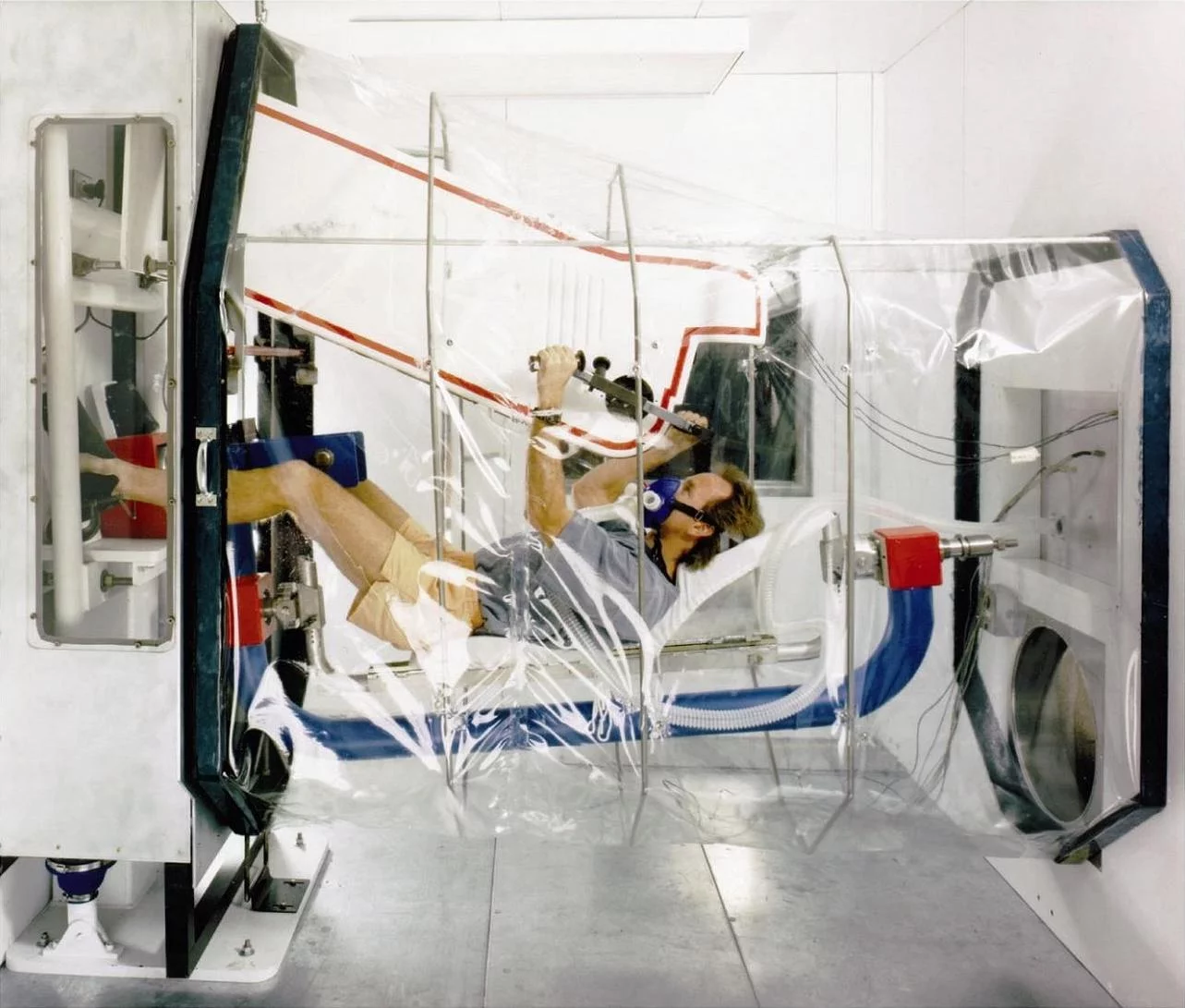
“I think [They Came From The Sun]’s probably our best work or certainly has some of our best moments. Where Ignoto took corners too fast this felt like running with scissors, much more personal and close up, skulking and lean.”
As I said earlier TCFTS had a very long gestation in comparison to the other two, there was a lot of music, in the period between Ignoto and TCFTS there are probably about 30 songs including those that appeared on the final album. With the room we were able to treat it like a job, that was our office, we went there Monday to Friday to work and earn our wages. We went down knowing we were either going to rehearse for a gig or write or both. It was pretty constant, so again it was so commonplace that there wasn’t really anything to remember as it wasn’t unusual. We’d start with something, think if it felt like an intro or a verse and then write around it. We’d then stop when we were stuck or happy, then we’d play it again next time and see if it was still good and if it was we rehearsed and recorded it, if not work on it until it was better.
Occasionally Paul would come up with something melodically that required a change but that was few and far between, we always started with the music and added the words and melody afterwards. So by the end TCFTS was a collection of the best, most recent songs. I do think it hangs together as an album very well, it certainly wasn’t thrown together, in fact the running order and one particular song being included is the only time we’d had a full blown argument where someone threatened to quit the band if they didn’t get their way.
It went through a lot of iterations, I remember Dicta Boelcke starting and ending the album, then Dicta Boelcke into Screaming Ground then into Dicta Boelcke to start the album. There was a full intro track in the style of Audition that got scrapped as our A&R was all “ah intro tracks are unnecessary artistic indulgence, let’s talk about Robocop!”.
So TCFTS again didn’t really sell, I’m not sure if it did as many as Ignoto but things got problematic. Money was tight, we knew that the next record if it was optioned wouldn’t be funded in the same way and TCFTS had been largely self financed, maxing out credit cards to buy memory or mics or cables and stands, selling guitars to pay rent etc. everyone had cut costs to the bone.
Shaun had decided to leave and days later faced with no drummer, likely not a label etc. we decided to pause it all. There was a way forward but everyone was so tired the idea of giving your all and then having to dig deeper in order to exist in a lesser form just didn’t appeal.
When milo split up I was incredibly upset, my identity had effectively gone, but I was also incredibly relieved. Everyone had sacrificed a part of their personal life in order to allow the band to continue, I think we all needed to be ourselves in some capacity before we experienced burnout, or perhaps we already had and were only becoming aware then. We were certainly running on fumes but again, and frustratingly, not in a creative sense. If we’d felt like we weren’t being creative I think things wouldn’t have kept going for that long.
Past Reflections and Future Ventures
Well, like Faces sang, “I wish that I knew what I know now, when I was younger”. It’s weird, it’s taken me a long time to realise a) how lucky we were but also b) how hard we worked to get what we got. Should we have paused when we did? Maybe not. Could we have continued as we were? Certainly not. Leaving a healthy corpse and all that…
In a strange paradox I didn’t appreciate what I was doing or what I was experiencing as I took for granted that I needed to work hard to keep it alive, if I enjoyed it too much then it was sure to end – real avoiding cracks in the pavement suspicion and magical thinking. I lacked awareness, and obviously didn’t know it.
So would I change anything musically? Probably not – the only things I would have changed in the whole milo thing was I wish I had practiced the guitar more and knew more about tone and pedals as opposed to just making filthy sounds (although that was fun), and I’d have been keen to explore motivation and dynamics in the music a bit more, have more of a sense of a conscious direction to the music and the playing in each track compared to just getting a great take of a cool part. I’d like to have attempted to put the emotion of a song into the guitar take more.
“When Craig Jennings used to manage us he said it was like we were the last gang in town, there is a bit of feeling like you’re apart from everyone else which is both positive and negative; a pleasant aloofness… We didn’t have monetary success but we knew we were right. That’s an addictive feeling, being right.”
Since you’ve been in touch we have announced two shows at The Cluny where we played (and paid) a lot and the nearest and best pub to our rehearsal space – these are to raise money for the Sir Bobby Robson Foundation. I think we’re all closer than we have been at any point in the past. There were weird fallings out as people who used to speak all the time then don’t lose a sense of each other or there were slights or perceived slights and when left they don’t heal as quickly but all of that is gone now; beefs, side beefs and ulterior beefs squashed.
The thing is we all like the music and like each other and like the approach. We all told loads of jokes, we were all funny and it wasn’t lazy banter or cruelty disguised as fun, it was fun. I honestly think the fact that some A&R men knew they couldn’t sign us but came to Newcastle anyway to get drunk with us and laugh about things set the ball rolling for us as much as anything we were doing musically.
Like the Albini thing, being no bullshit wasn’t poe faced grandstanding, it was simple, at worst dispassionate “I’m just not really bothered by all that” which so many in the industry seemed shocked by, they were all so used to these people who presented their lives as the art either in creativity or excess that when five people in a rock band would start normal conversations it was in itself shocking.
When Craig Jennings used to manage us he said it was like we were the last gang in town, there is a bit of feeling like you’re apart from everyone else which is both positive and negative; a pleasant aloofness. There’s a bit on How To Spend £35k in a Month where Justin, just after calling myself and Ross ‘the fat cousins’, talks about the tour we’re about to join and tells Paul “I think we’ll be better than them all, a better band, better players with better songs and better as people”. It is funny because of how over the top it is with ego but that’s what it felt like to be in milo, we didn’t have monetary success but we knew we were right. That’s an addictive feeling, being right.
I think practically, it’s harder than ever to make music together given how busy everyone is and where people are physically located across the world…. which, given our approach and past history, means it’s more likely now than it’s ever been before! If it doesn’t make sense then we do it; it’s the milo way.

